Fish and Chips (Scottish Fish and Chip Shop Recipe)
Fish and chips made the way my dad used to make them in his chip shop in Glasgow is the tastiest way to make fish and chips. Learn how you can make this style of fish and chips, and you’ll understand why it’s called “a special fish”.
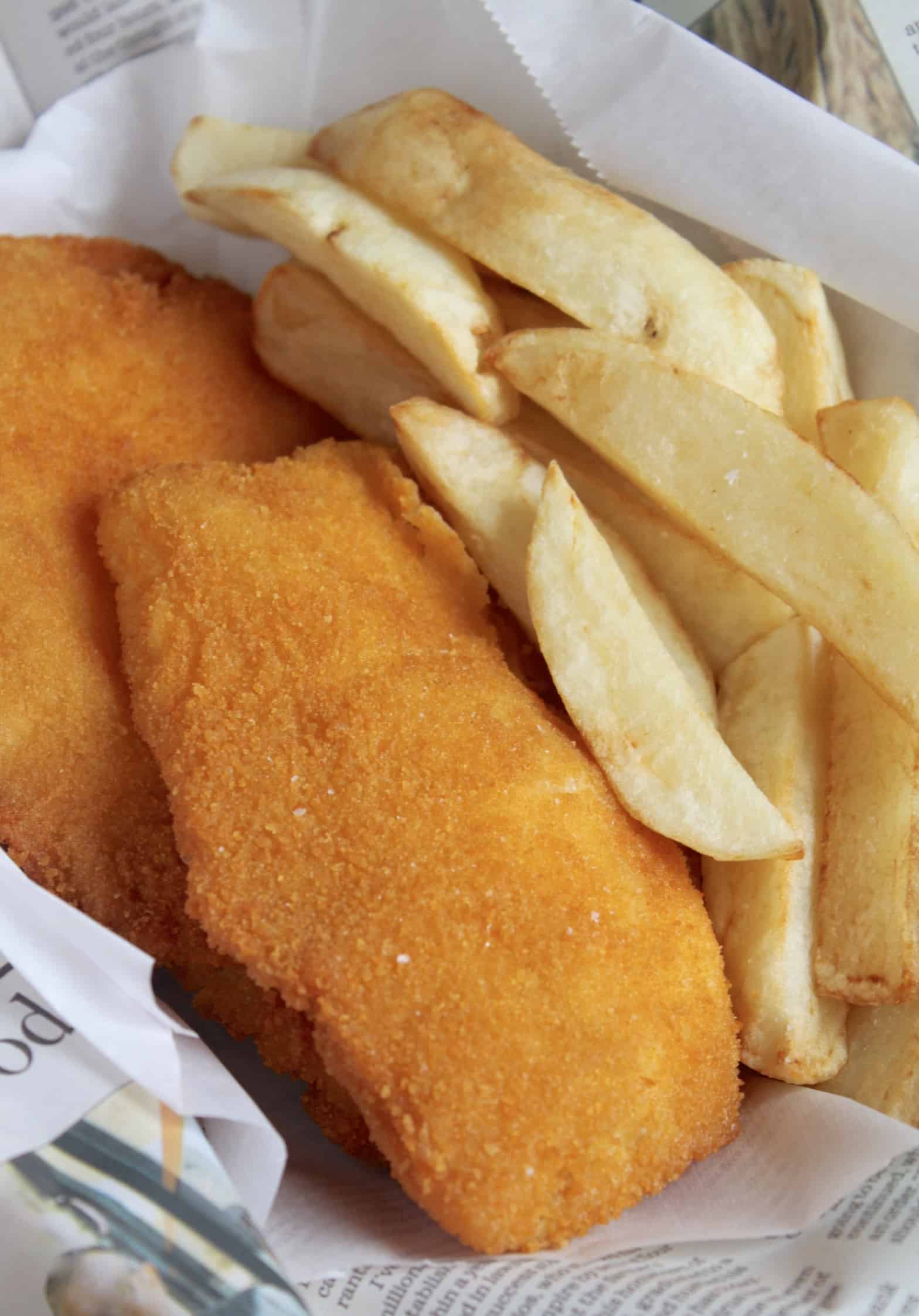
Fish and chips used to be a very big part of my life.
As an Amazon Associate I earn from qualifying purchases.
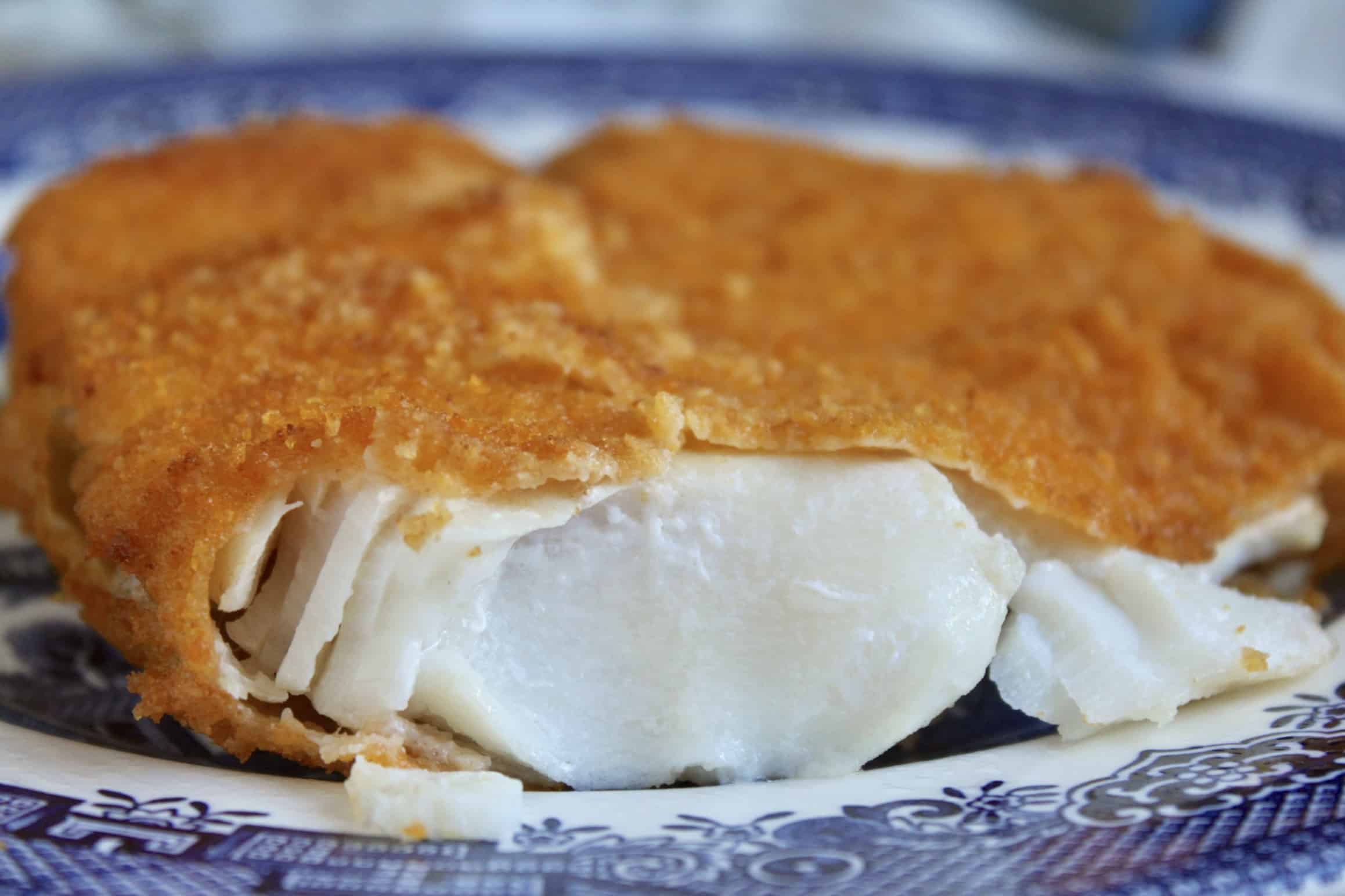
Growing up in Scotland, my dad had a fish and chip shop in Glasgow. It was established in 1928 by his grandfather who came from Italy, who then passed it onto his son, my grandfather.
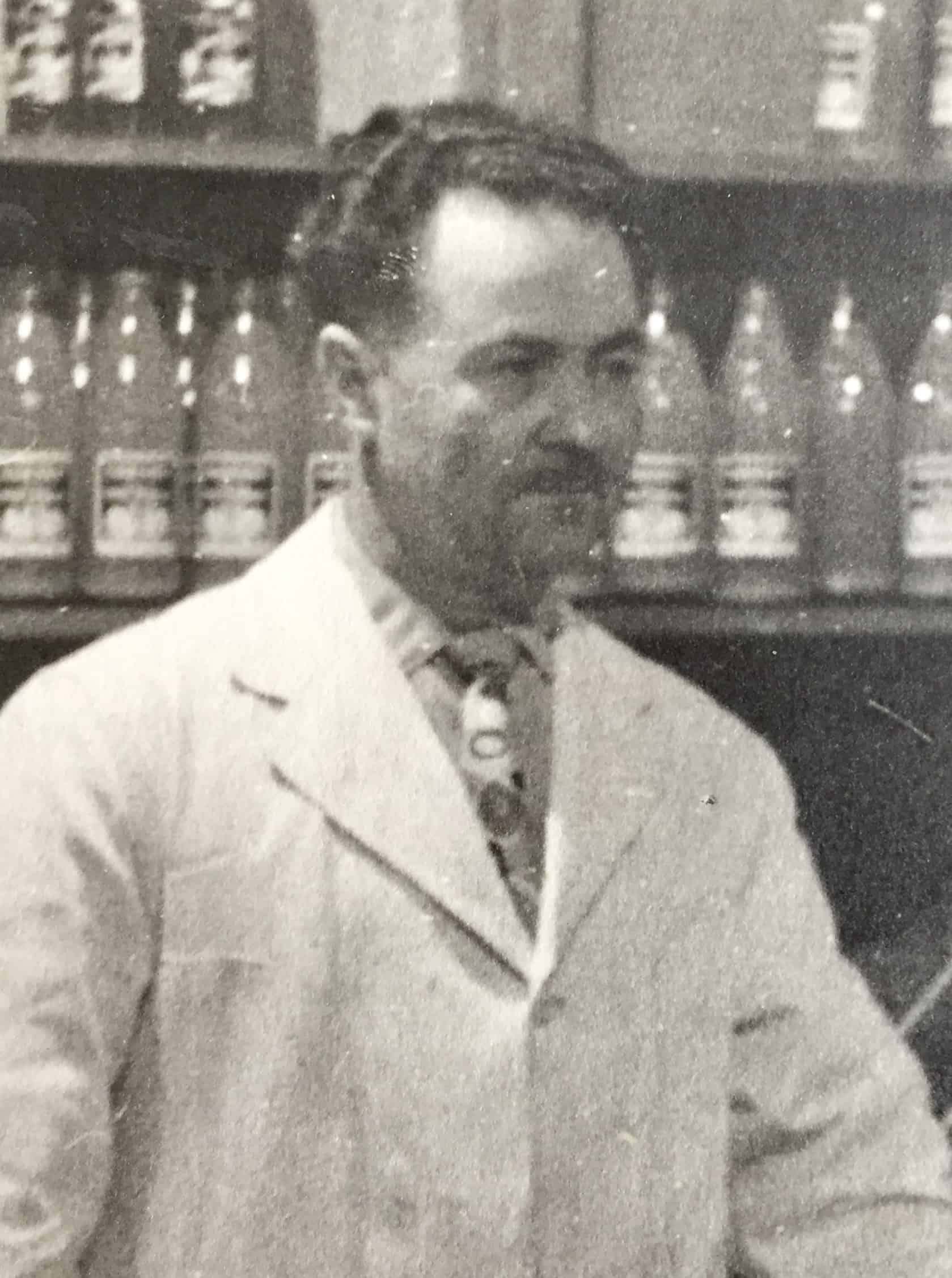
(This photo, which was taken about ten years ago, is in my “About” page. You can see how happy it made me to have fish and chips from the shop!)

Eventually, there were two chip shops, and my dad and my Uncle Fred (who was also my godfather) ran both of them during the 60s, 70s and 80s, alternating between the shops each week. Sadly, Uncle Fred passed away last April (2020). This photo was the last time my dad saw him (2017) .

One shop was sold and my cousins ran the remaining one until 2017. Here’s my mother with my cousin, Pete, in the back shop. He was her favorite nephew in this picture, can you tell! Sorry for this long-winded post, but I don’t just want to publish a recipe without you knowing how precious it is to me, and my family.
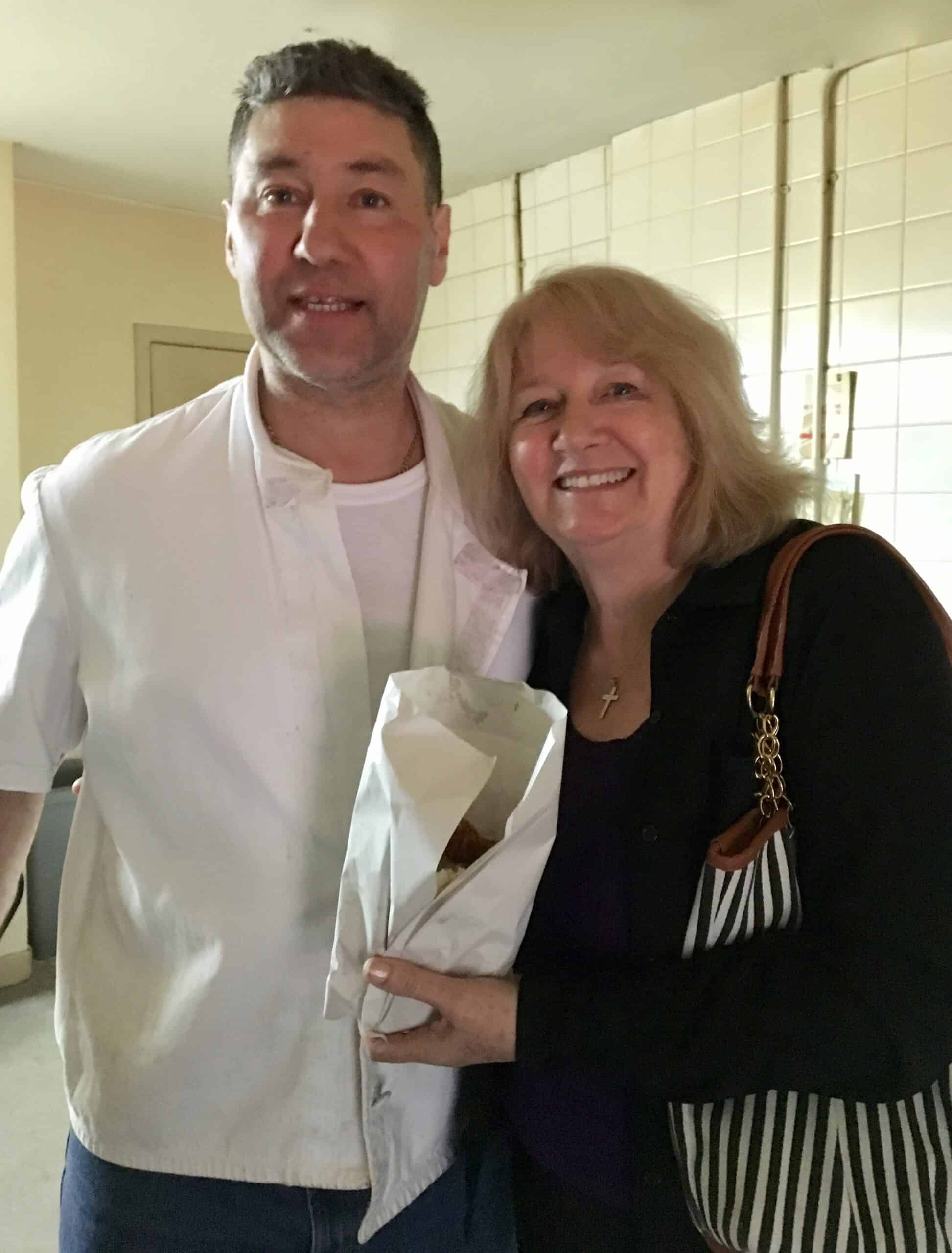
Fish and Chips in a Crispy Coating?
I’m sure you’ve noticed the fish isn’t battered (it actually is battered), but coated in a crispy, orange-colored crumb coating which is called “Ruskoline”. We just call it fish dressing, and recently I had called my cousin Pete, who ran the fish and chip shop until just four years ago, to ask about sending over some of this dressing. His wife, Helen, looked into the cost of shipping and it was outrageous, but I was actually thinking about having her send it anyway.
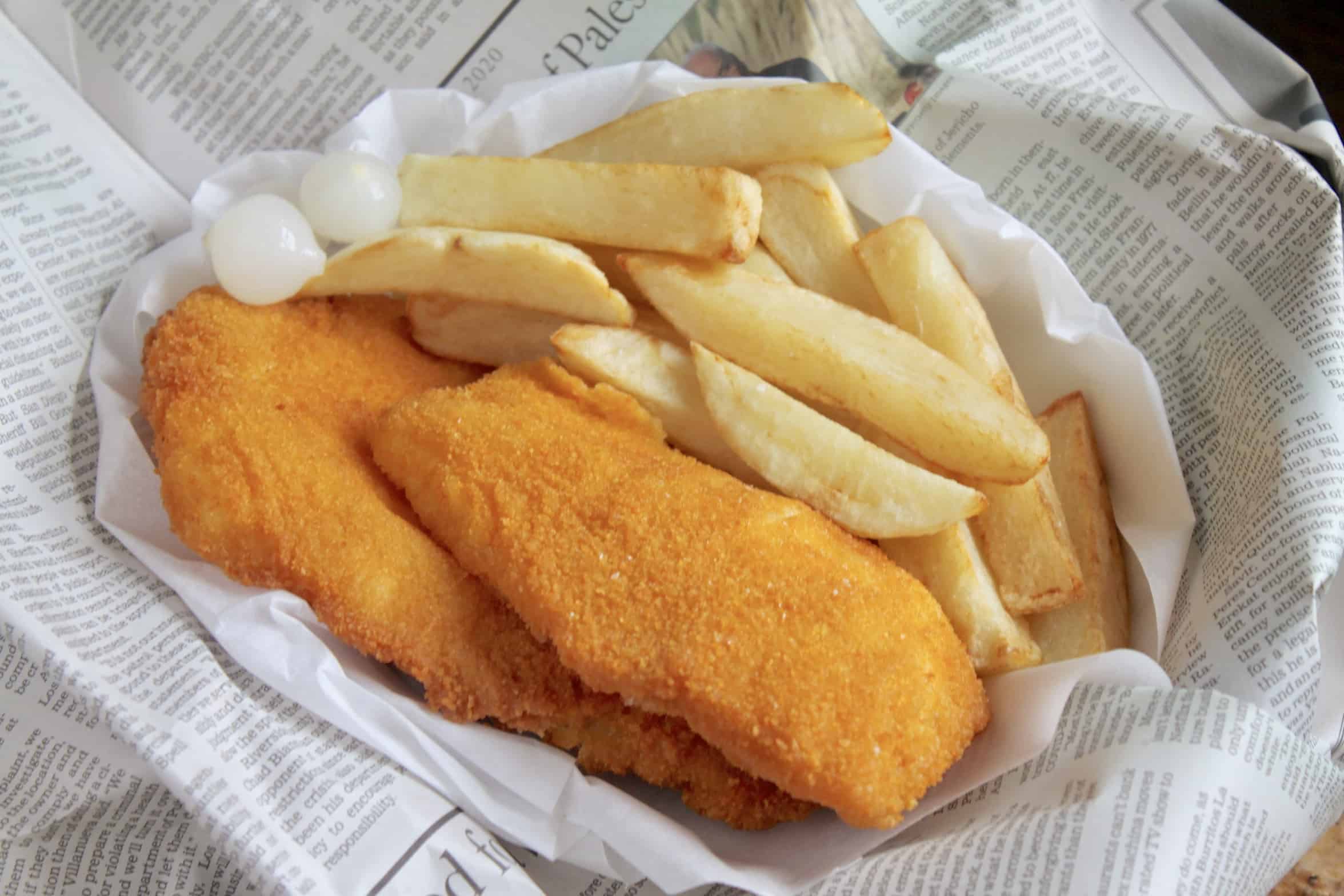
Until I discovered a very similar product on Amazon of all places! Paxo golden breadcrumbs, and it was much more reasonable than paying the outrageous shipping of the Ruskoline from the UK. So now that I know this product is available to those of us in the US, I can finally share my dad’s recipe for fish and chips!
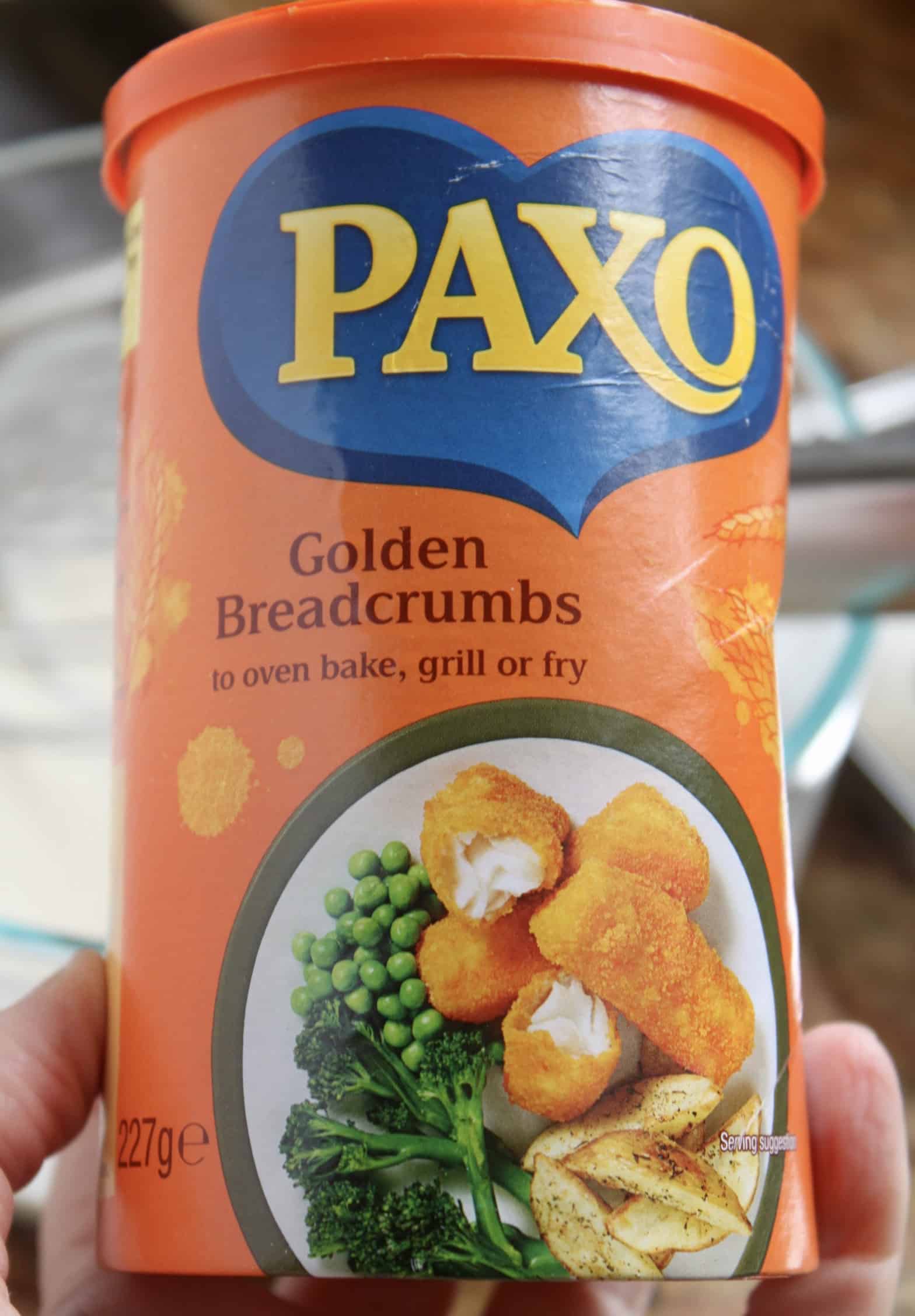
Special Fish
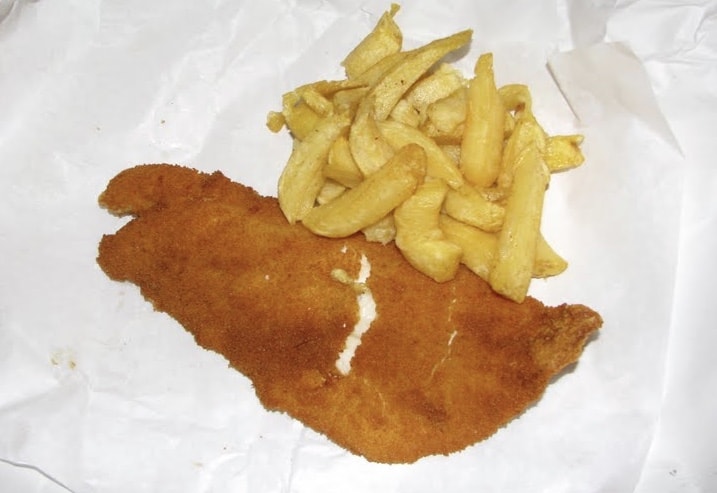
If you wanted a crumb-coated crispy fish, you’d ask for a special fish, or a special fish supper (which included chips). My dad did also have fish with just the batter on the menu, but our firm favorite was a special! In fact, on Friday nights, I was allowed to stay up until my dad was finished working at the fish and chip shop. I’d call him to place my order before he came home, and I’d always order a special fish supper and add, “Don’t forget the onions!”
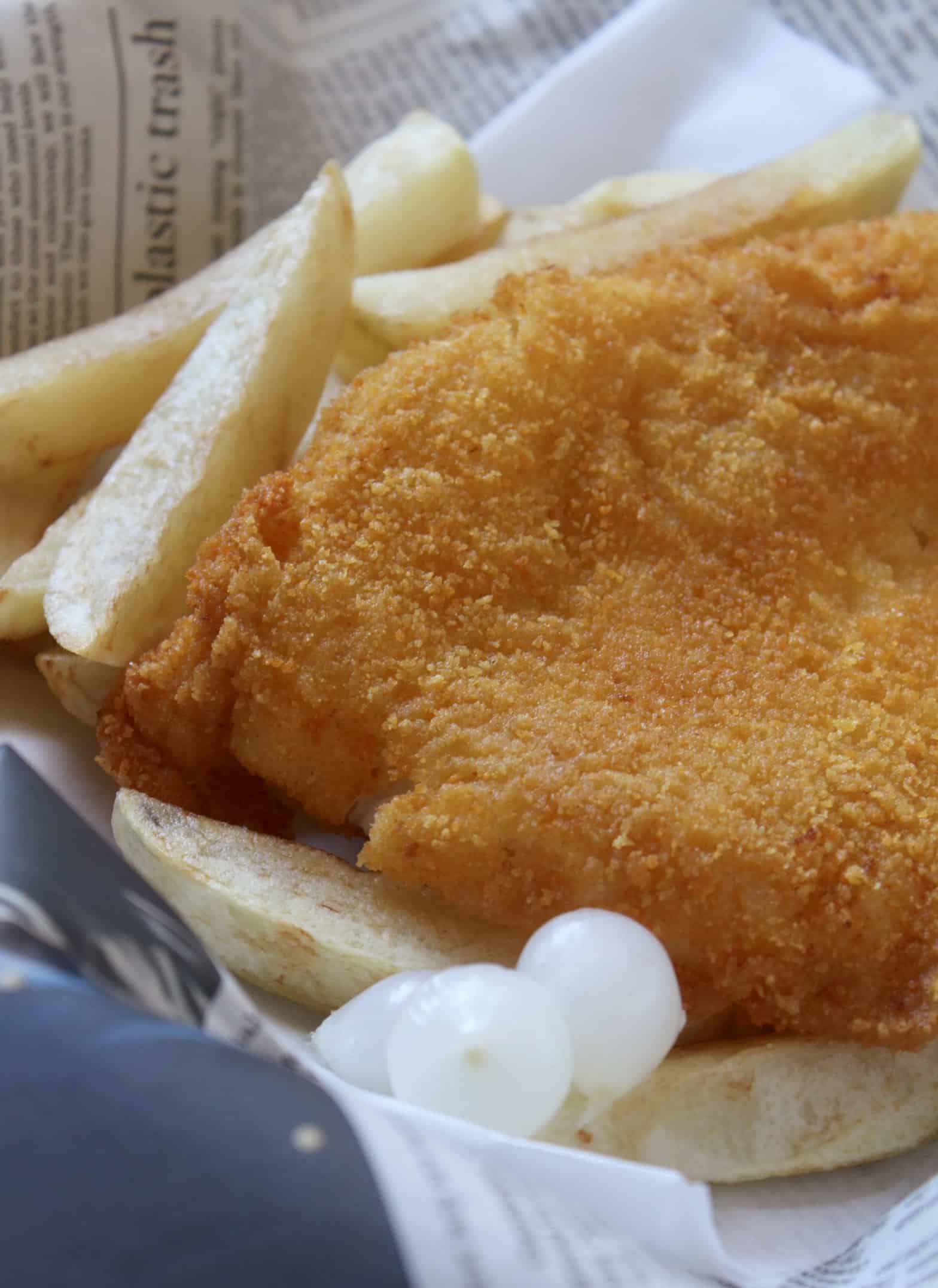
While these small Mezzetta pickled onions are good, they’re nothing like the larged penny onions (they cost a penny each) that dad used to have in the fish and chip shop.
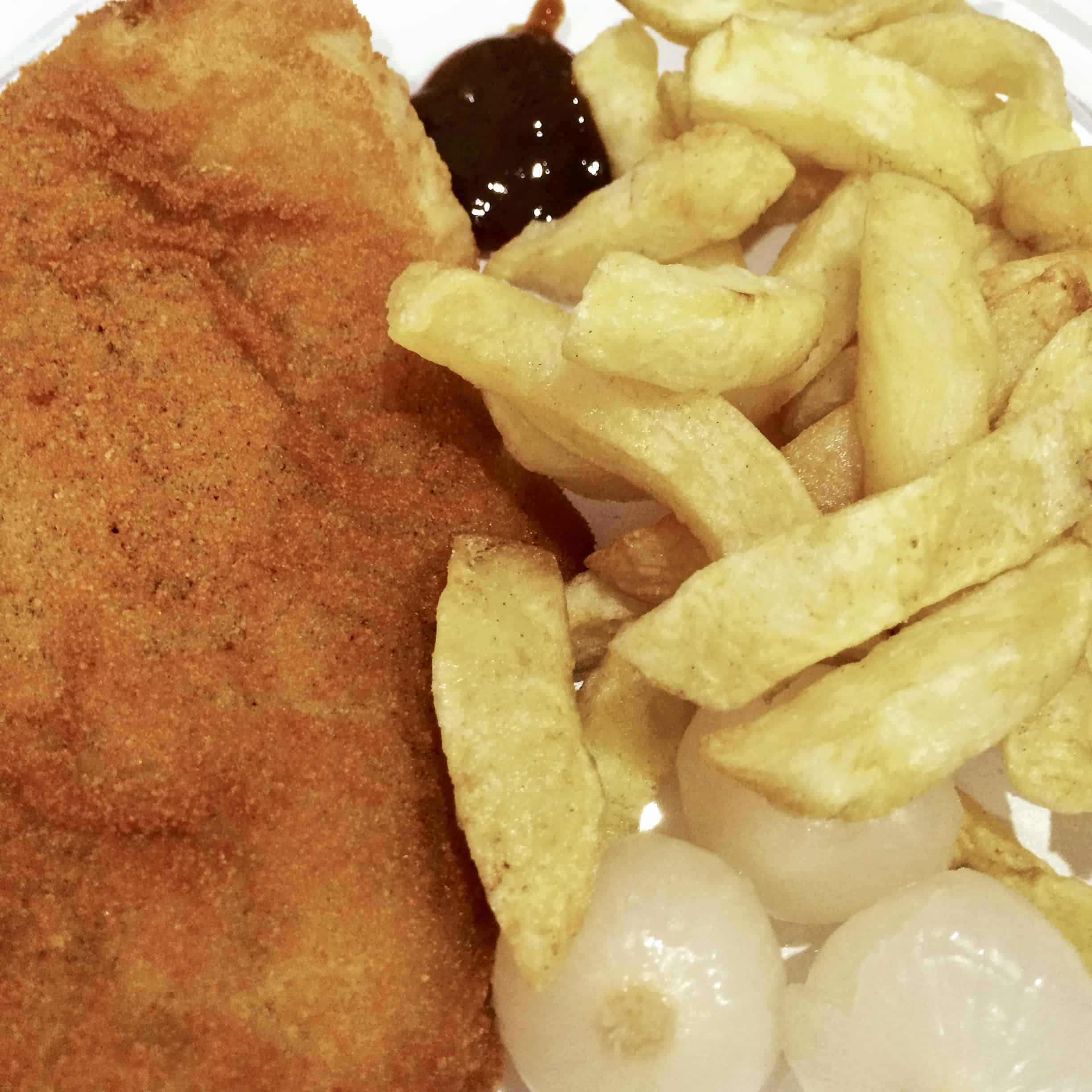
I also loved a battered and deep fried black pudding (the one in the photo isn’t battered). I miss all this chip shop food so much, which is why I try to recreate as much as I can, not just for me, but for all my other fellow ex-pats who also long for these dishes. So let’s get down to business.
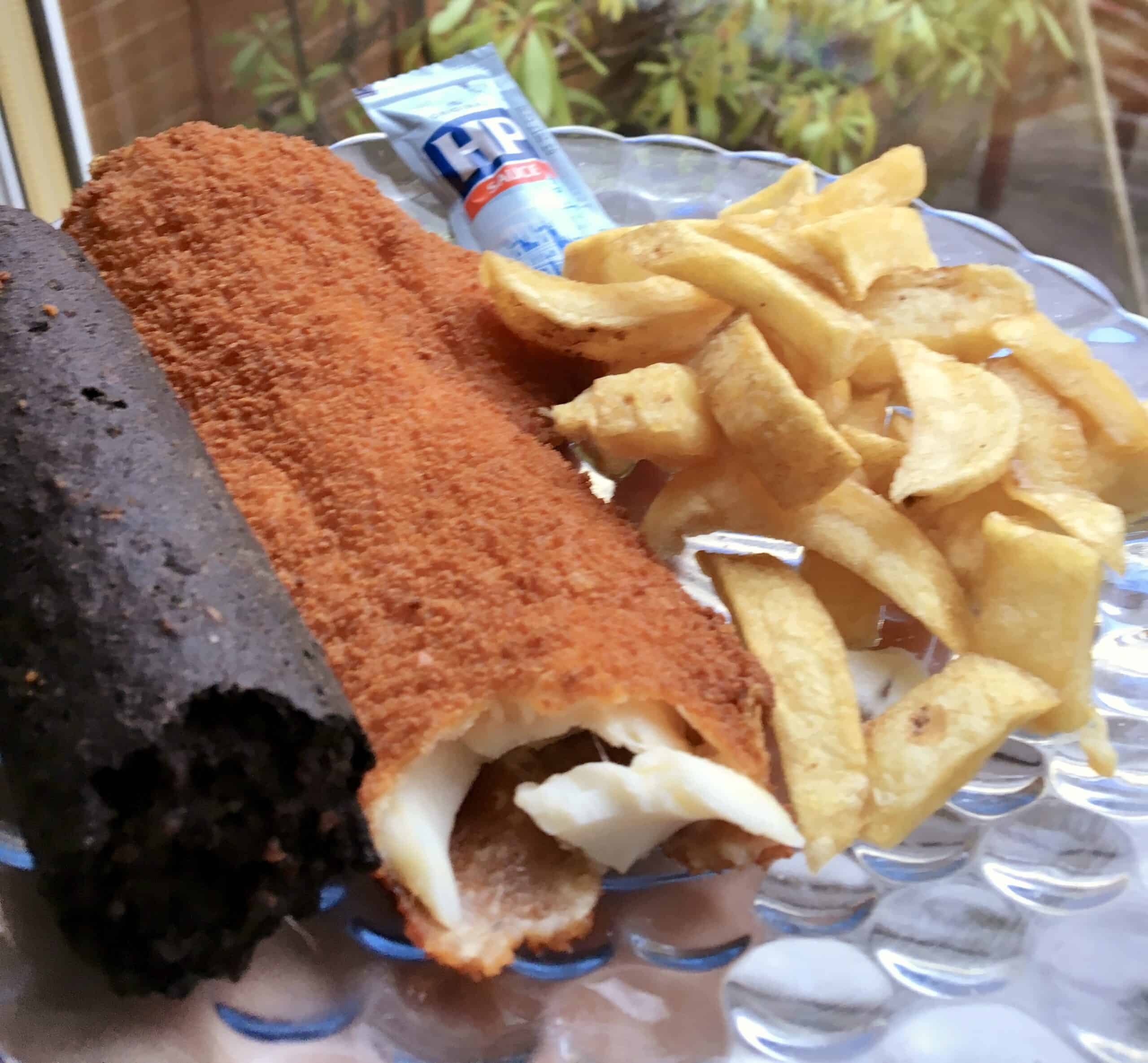
What is the Best Fish for Fish and Chips?
According to my great grandfather, grandfather, father, uncle and cousins, who all ran the fish and chip shop in Glasgow, the best fish for fish and chips is hands down, haddock. Haddock is related to cod, but is a much more flavorful fish, with big tender flakes. Don’t get me wrong, cod is a very good fish, it’s just that haddock is even better. Remember, if any fish you eat tastes “fishy”, it’s because it’s not fresh. Fresh haddock is absolutely phenomenal.
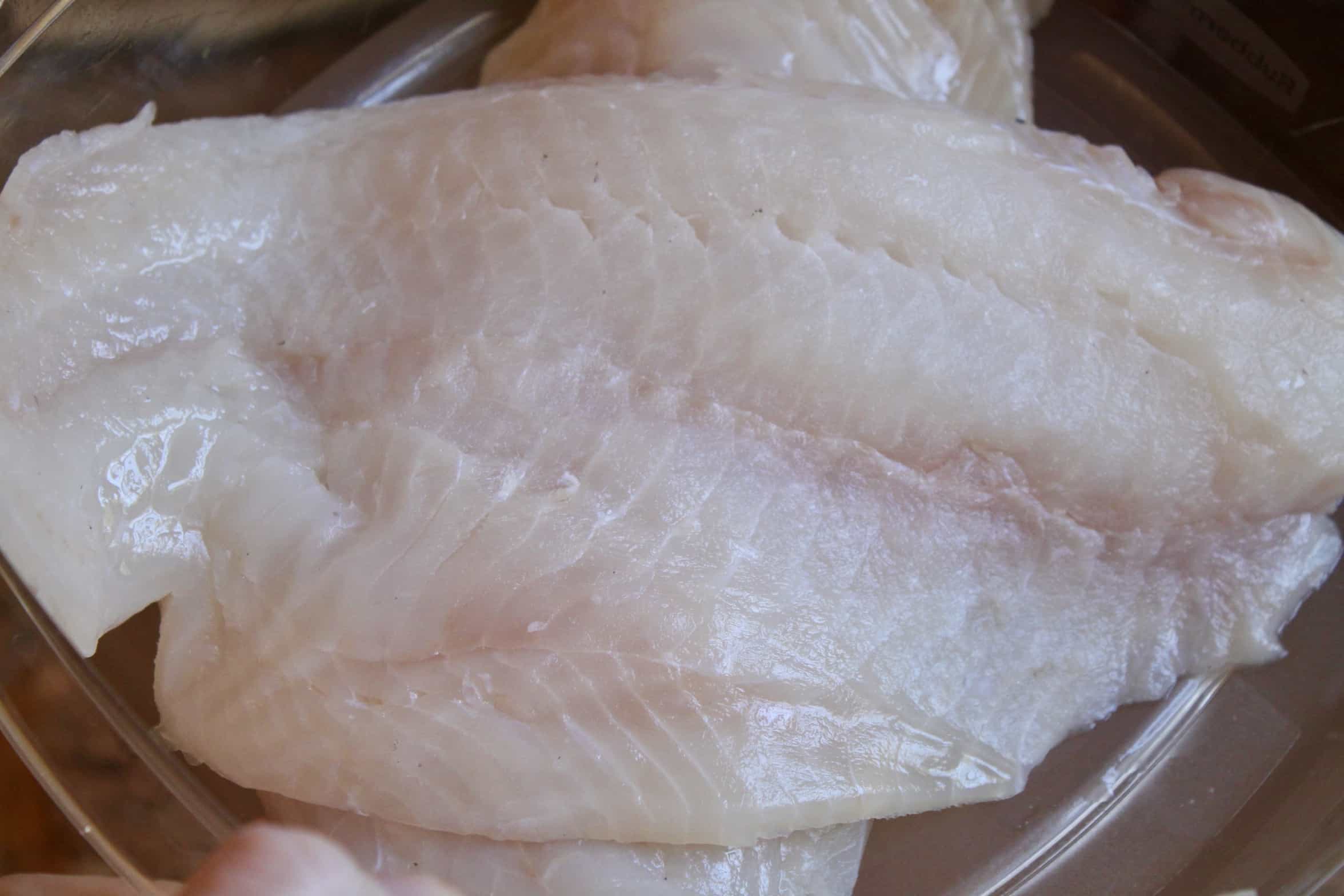
Good Quality Fish and Potatoes are Important
If you’ve ever been to Scotland, you may have noticed that lots of the fish and chip shops have Italian names. That’s because a lot of Italians immigrated to Scotland in the late 1800s to escape poverty and famine. Fish and potatoes were plentiful and cheap, so the Italians helped popularize this iconic British meal.
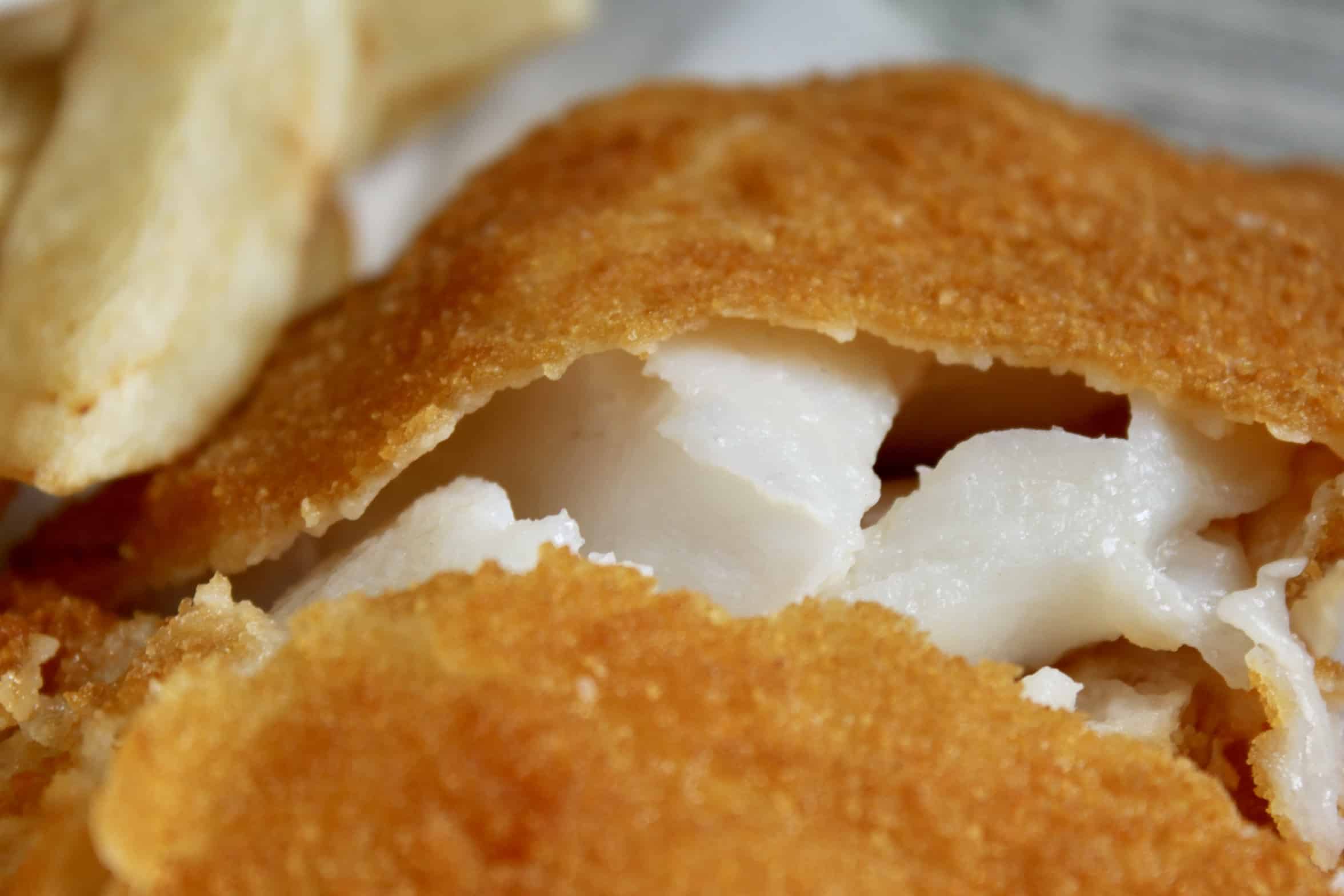
It’s important to have the best quality fish available, whether fresh or frozen, it’s going to be key for getting really good results with your fish and chips. I recently discoverd Get Maine Lobster, which sells so much more than just lobster! However, all of their products are absolutely top notch quality, and their customer service can’t be beat! Use my link and you’ll receive 10% off your entire order!
Order some lobster with your haddock and make this amazing lobster pasta!
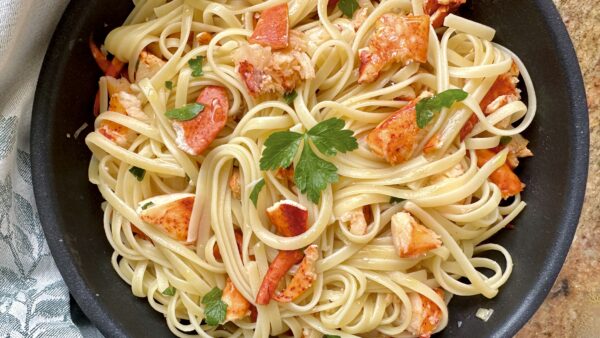
Same applies for the chips–organic, quality potatoes are going to taste best. Although Russet potatoes are more dry, and suited to frying, if you only have Yukon Gold, those are good, too.
In the fish and chip shop, tallow (beef fat) was used for frying. I used a combination of olive oil and sunflower for these fish and chips, but I’ve since discovered organic beef tallow online, so I will be trying this next time and will edit this post to update! Fish and chips should never be greasy, either. If it is, something is wrong.
What else do I Need for Traditional Fish and Chips?
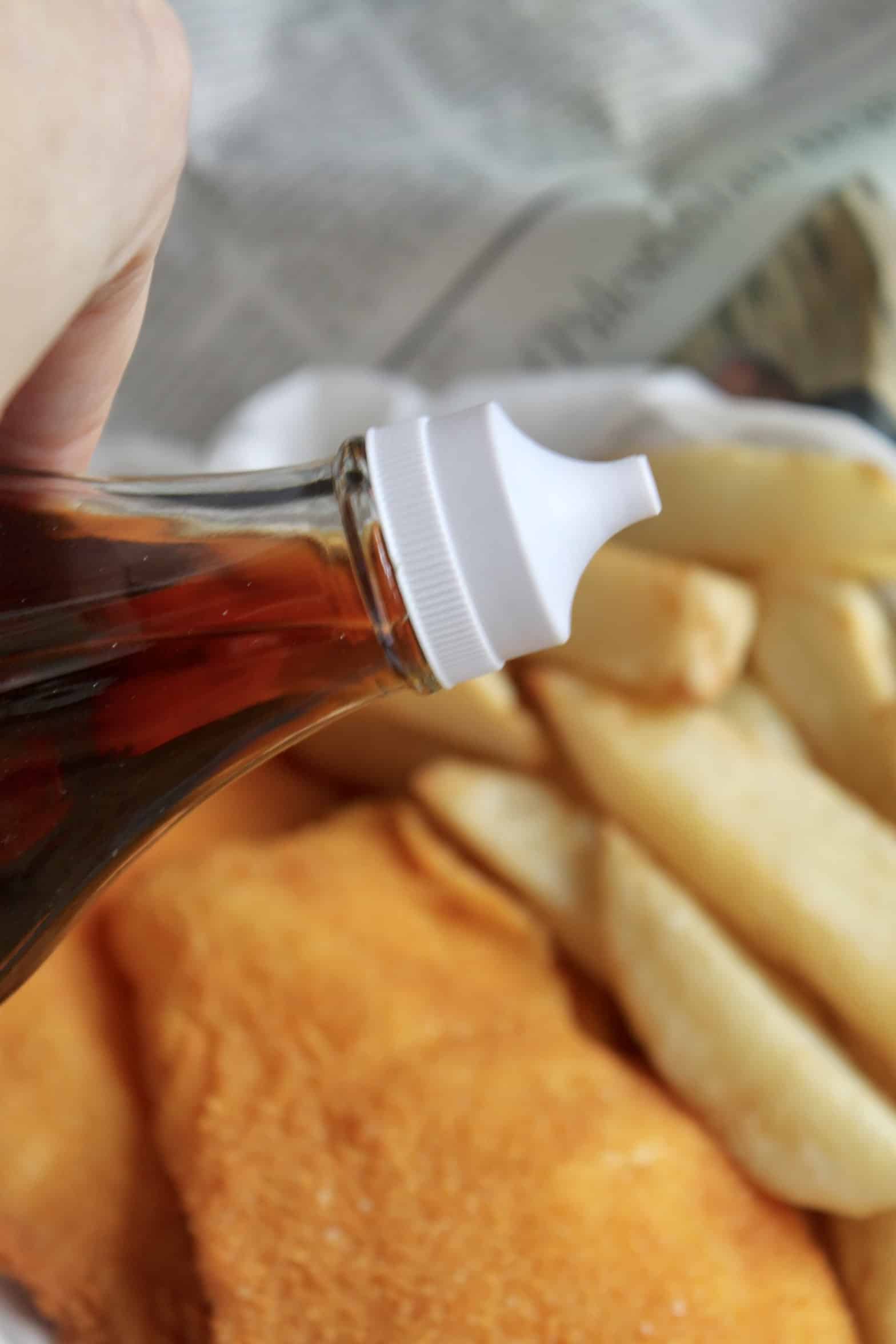
I’ve already mentioned the pickled onions, but good salt and malt vinegar and also important. My dad wanted me to note that they didn’t use malt vinegar, but acetic acid, which is much stronger. It had caramel coloring in it, so it actually looked like malt vinegar. I’ve tried looking for acetic acid vinegar, but the only kind I’ve found is for cleaning, so malt vinegar will have to do. HP Sauce is really good with the chips!
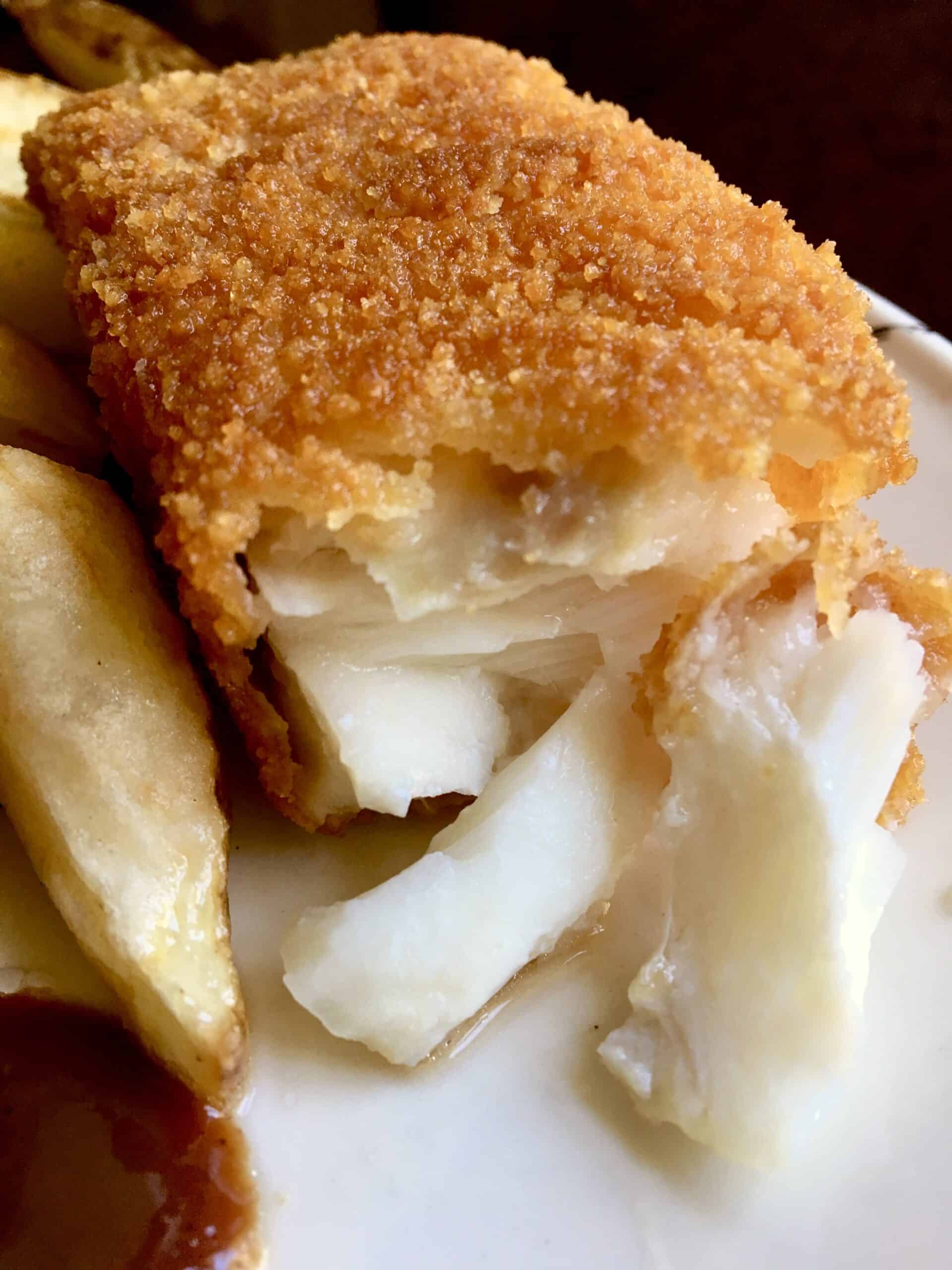
Note: if you’re going to fry the chips and fish in separate pans simultaneously, it’s not a bad idea to enlist the help of a second person. Managing two pots of hot oil while battering and breading fish is always easier with assistance.
How to Make the Best Fish and Chips
Conte Family recipe makes enough for 3 lbs of fish
FULL PRINTABLE RECIPE BELOW
Marinate the Fish
Place the haddock (or cod) in a bowl and fill with water just to cover the fish (use as little water as needed). Remove the fish and add the salt and vinegar; stir to dissolve the salt. Put the fish back into the brine and allow to marinate for one hour at room temperature. (Minimum one hour, but if you leave it too long, it can get too salty.) Afterwards, remove the fish and put it on a rack to dry.
Cut and Soak the Chips
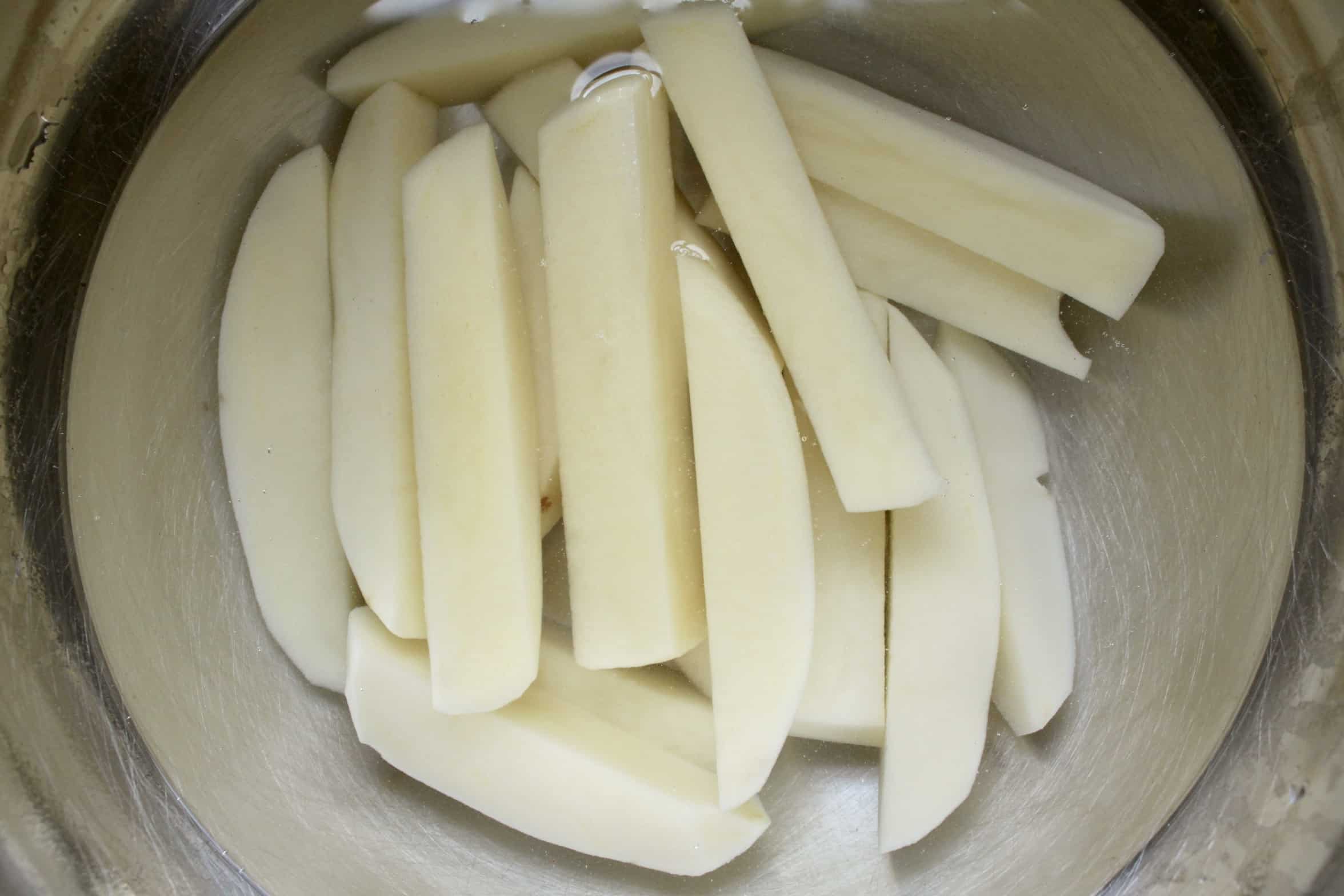
Peel and cut the potatoes into chunky, thick chips (as seen in the photo above) and put into a bowl of cold water. Be sure to cover all of the potatoes or they will turn black.
Prepare the Batter and Fish Dressing
Put the flour, baking soda and salt into a bowl and stir with a whisk; make a well in the center. Mix the milk and water together in a jug and pour into the dry ingredients. Whisk into a batter and keep whisking until a thick consistency is formed. It shouldn’t be so runny that if falls off the whisk quickly, but not so thick that it doesn’t want to drip at all.
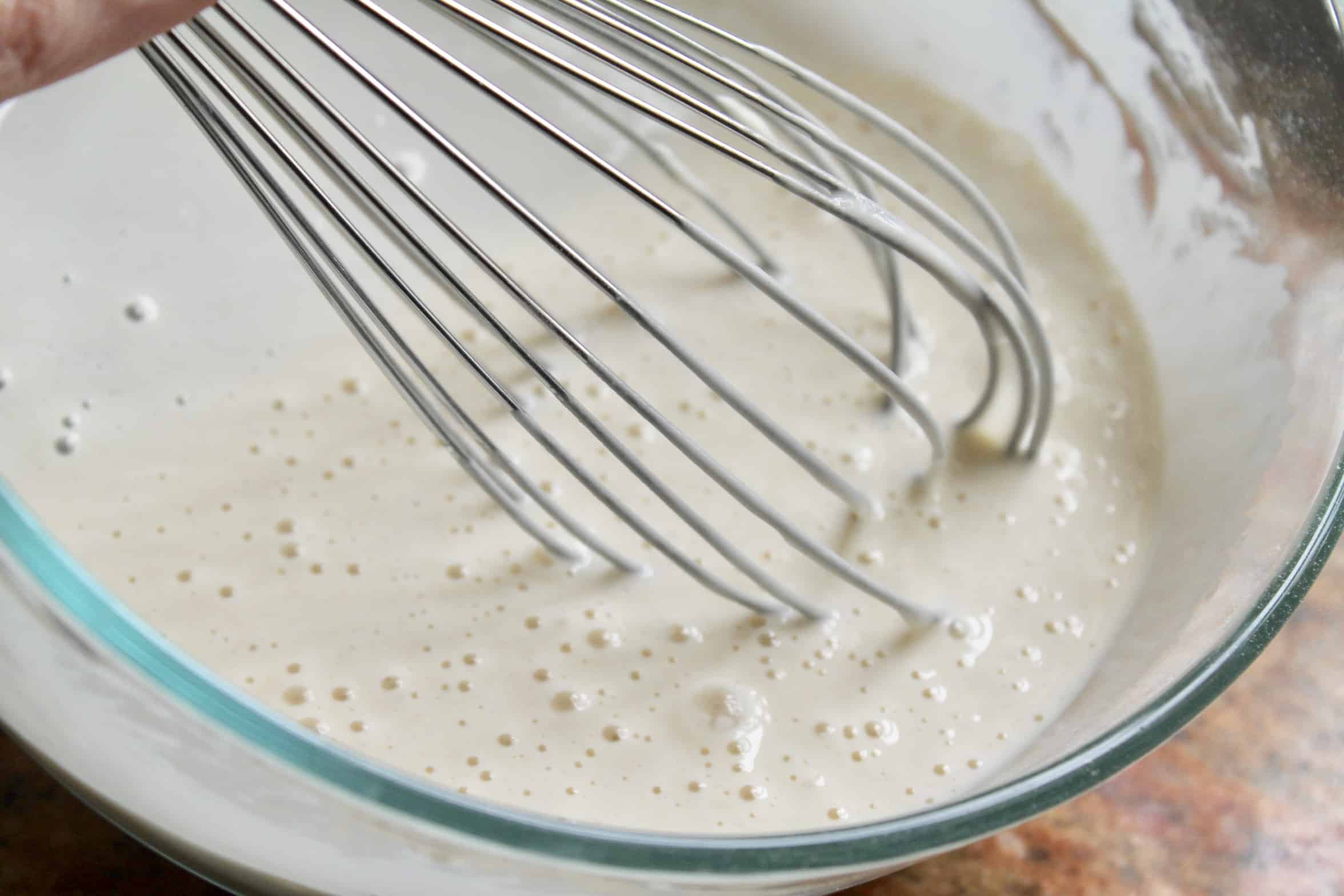
This is a good consistency, when it flows smoothly, but slowly. Pour some into a tray, or plate, where you can batter the fish easily.
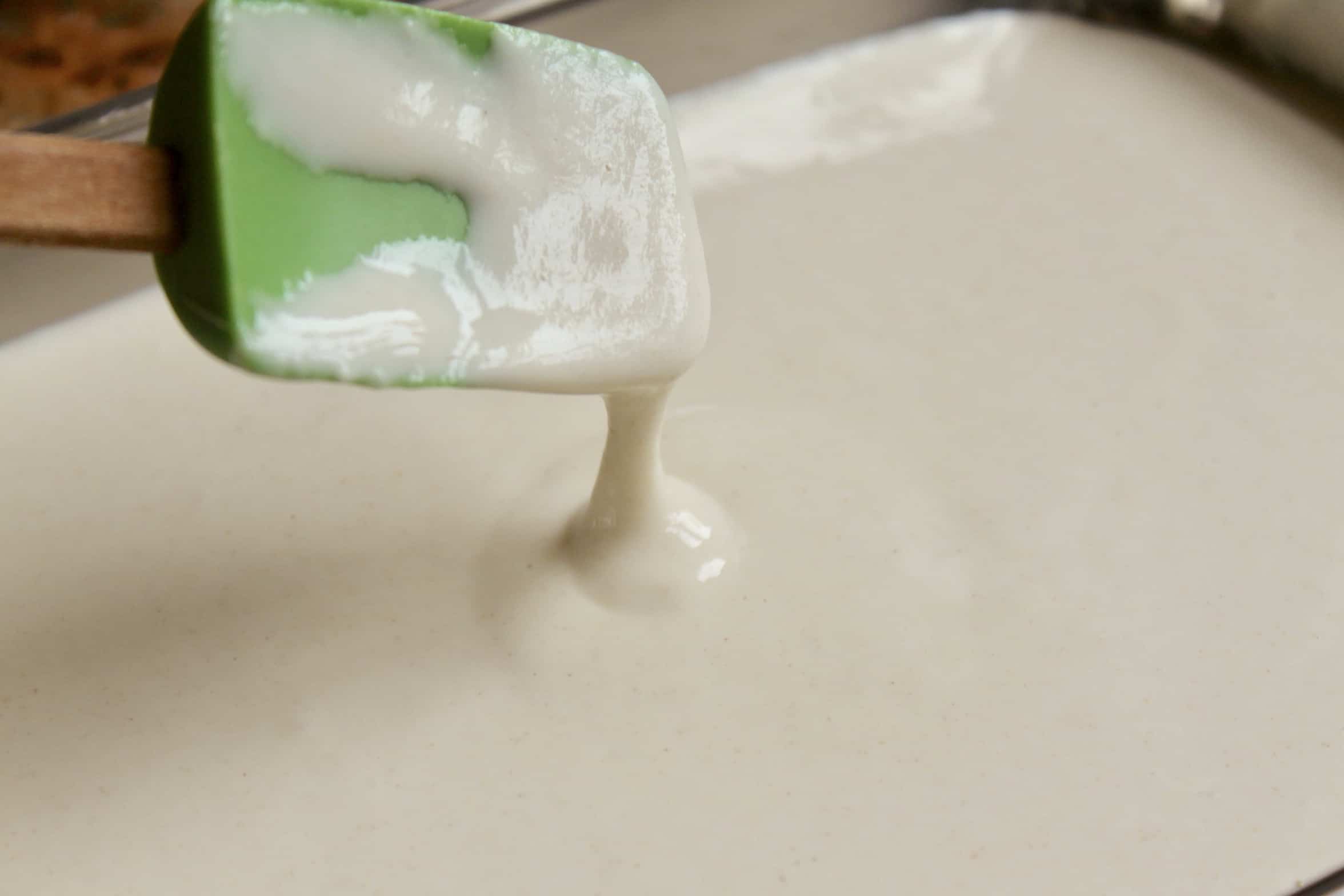
Put some of the Paxo fish dressing in another tray or plate. I like this set of trays.
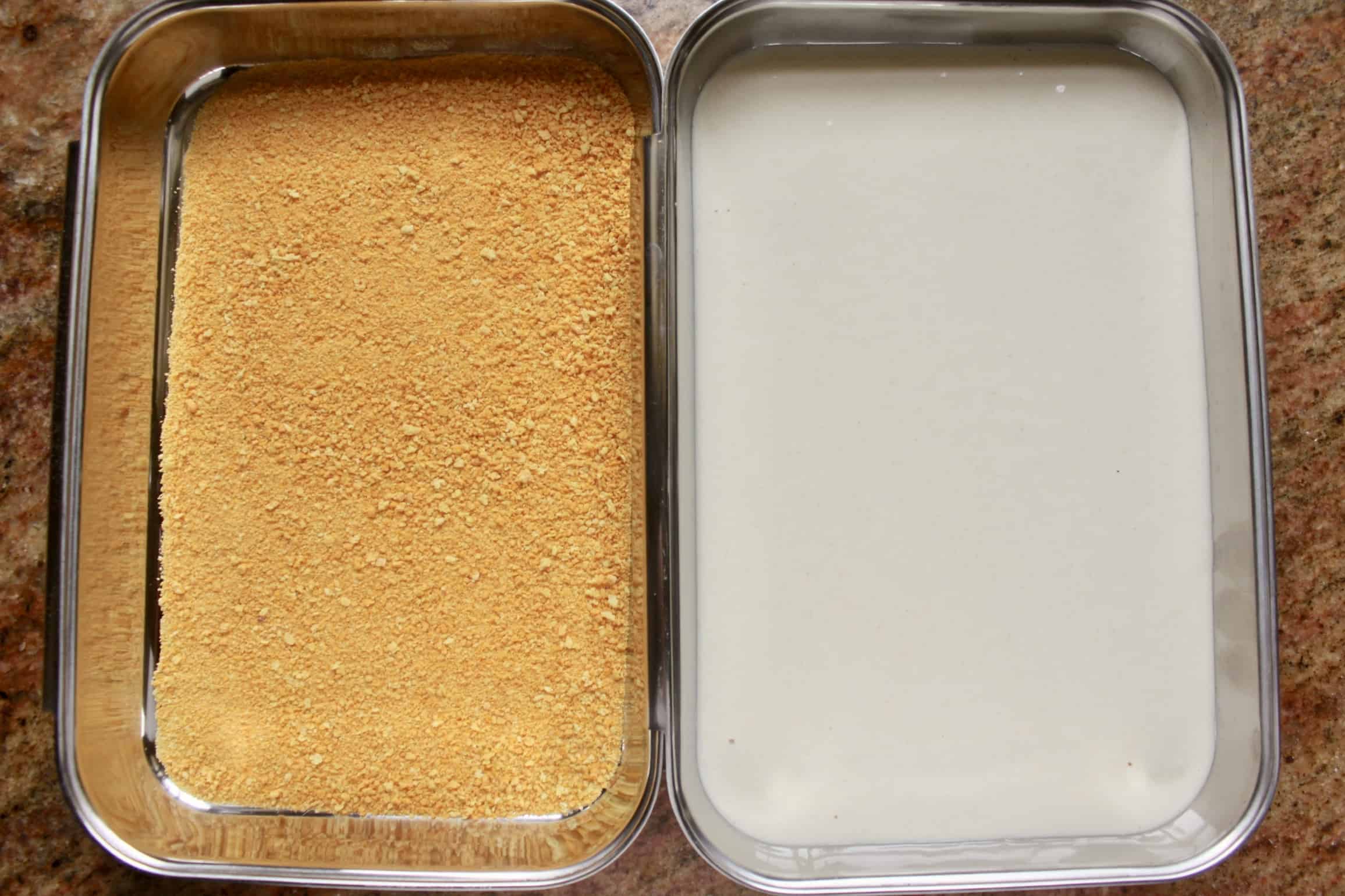
Prepare the Chips
No matter how you prepare the chips, dry them well after taking them out of the water.
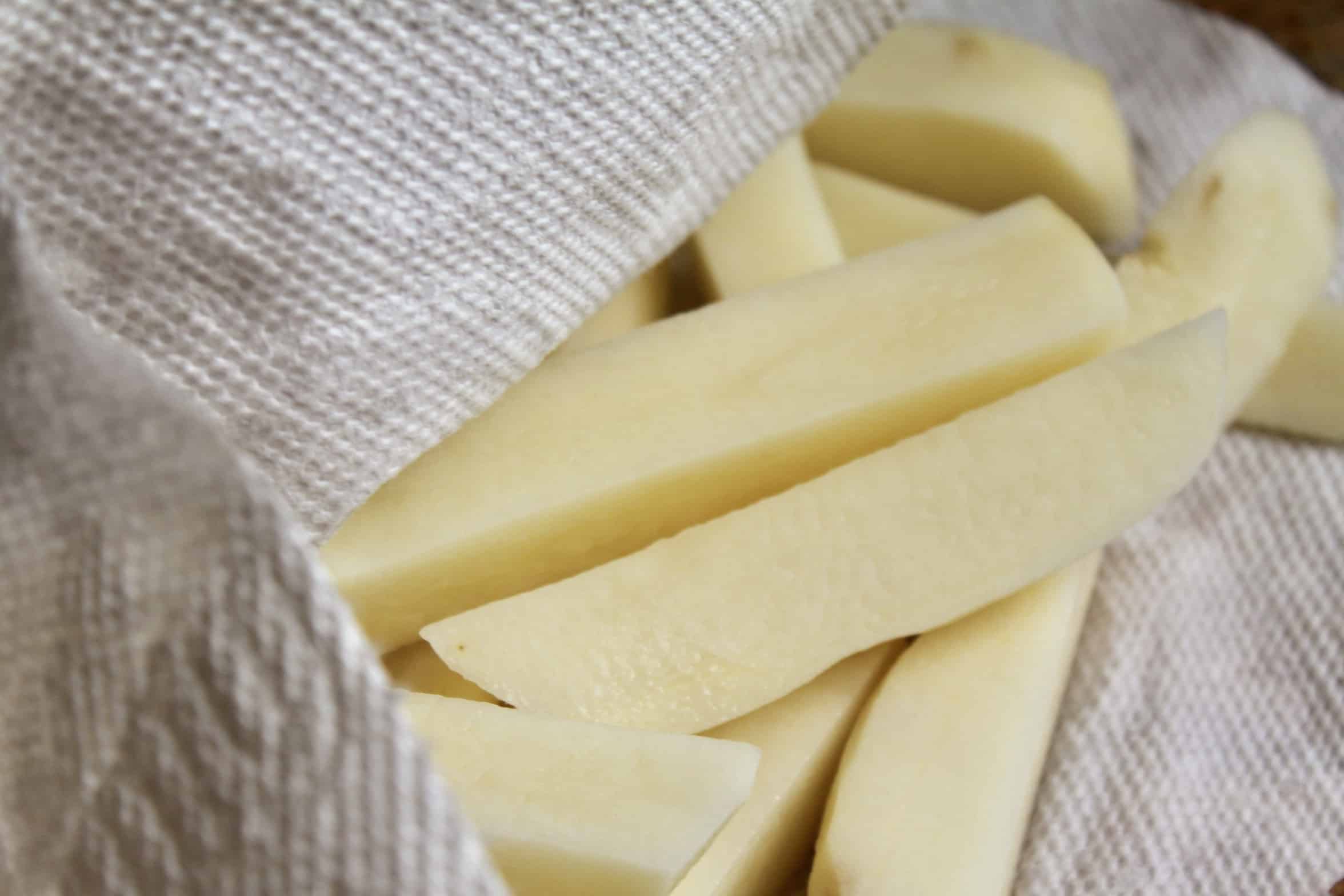
You have some options when it comes to preparing the chips. You can fry them in the oil where you will fry the fish, then heat them up just before you’re finished frying the fish (in the oven or an air fryer). Or you can simply make the chips in the oven or air fryer, or fry them in a separate pot or deep fryer.
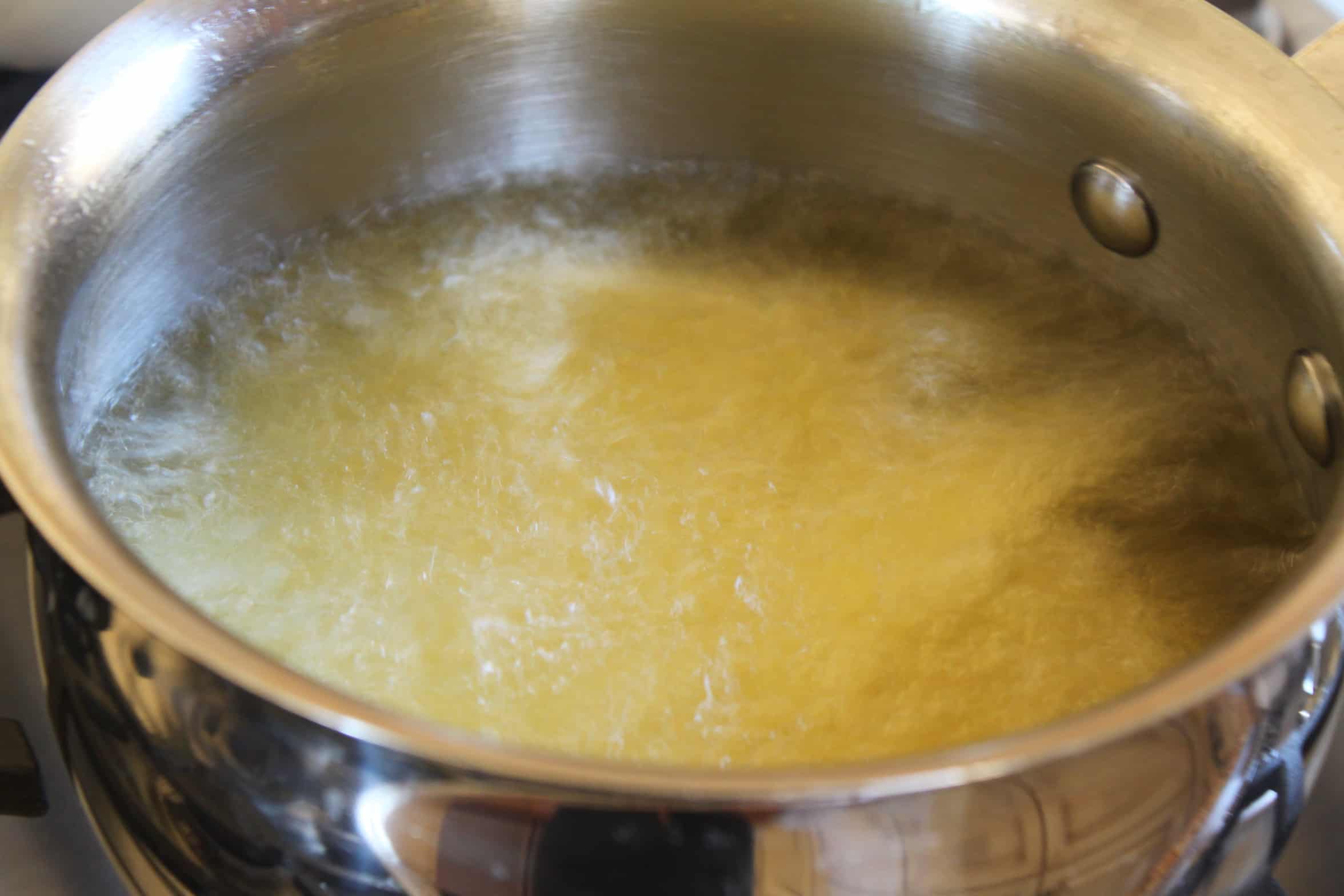
If frying, I find it’s worth taking the extra step to fry the chips for about 5 or 6 minutes, then remove them from the oil, let the oil heat up again, then add the chips back in to finish cooking. It makes them more crispy and delicious this way.
Prepare the Fish
In a large pot, or wok, heat the oil to about 360 F (180 C).
Pat the haddock fillets completely dry with some paper towel. If they are too large, cut them to the size you desire. Cut a little piece of fish, dip it in batter and fish dressing and fry it in the oil when it’s ready. This will test the temperature of the oil and you can taste the fish to see if it needs more salt. If it tastes undersalted, add more salt to the batter.
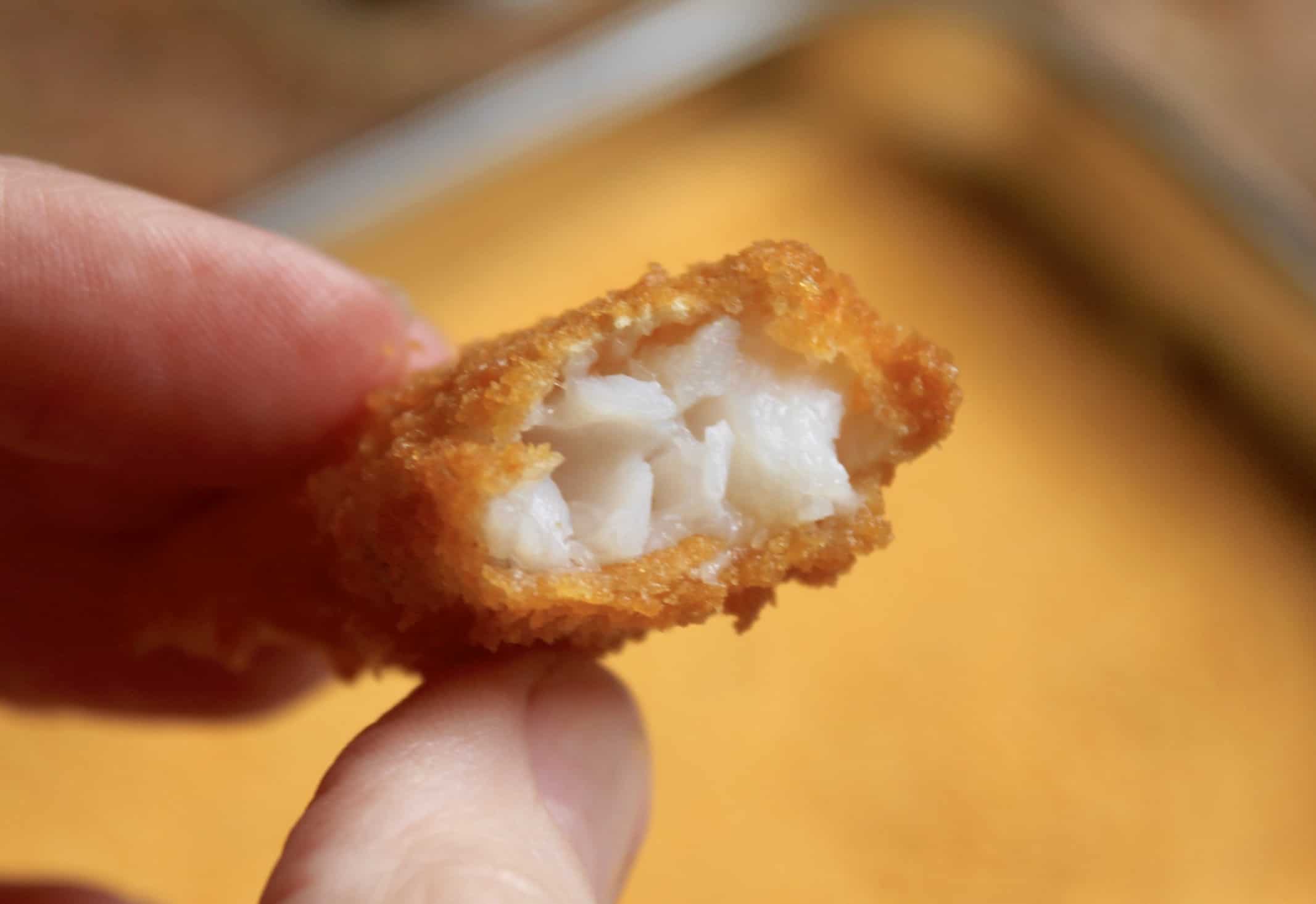
Using your fingers, dip the fish into the batter and allow some to drip off before place into the fish dressing.
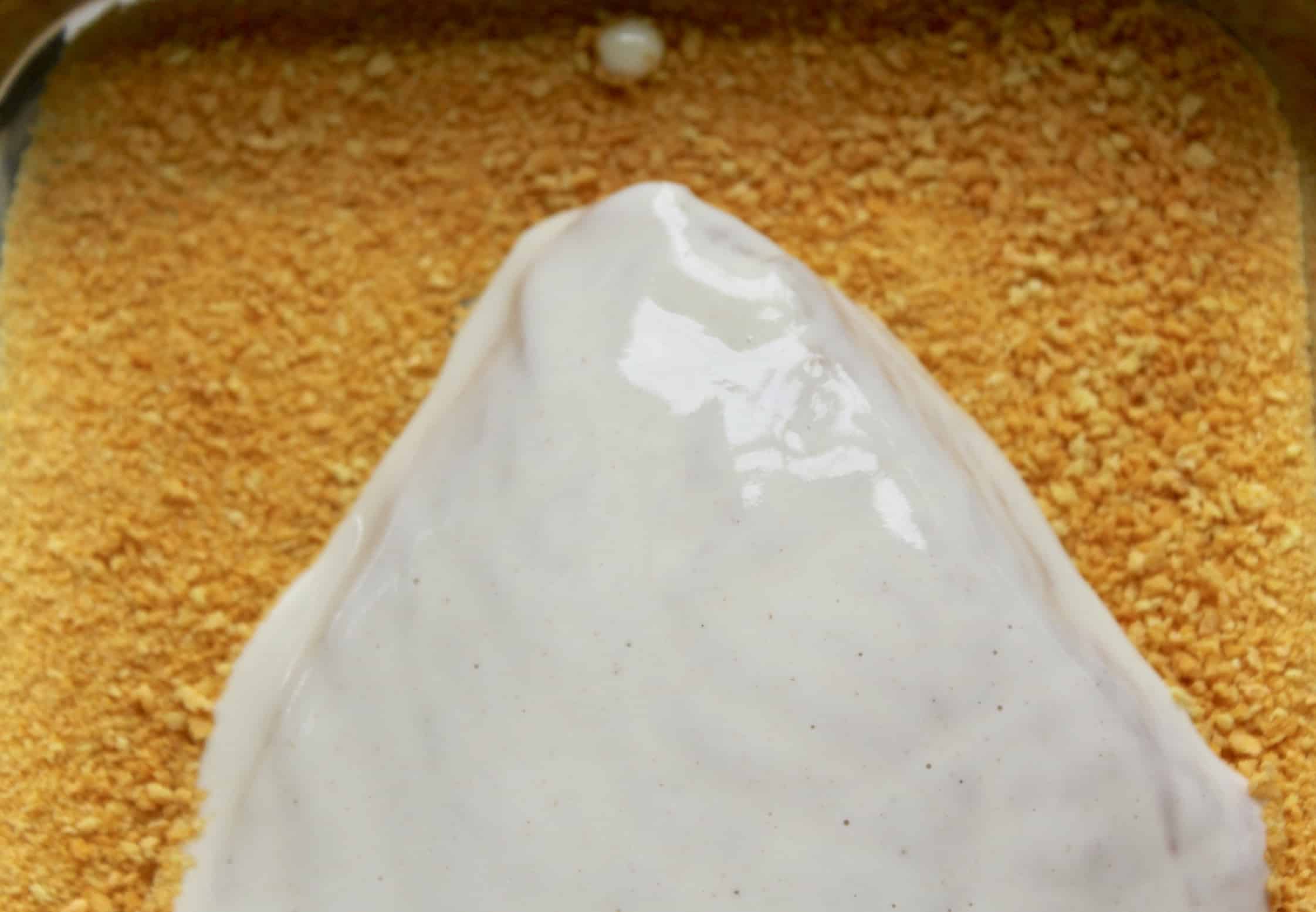
Shake the tray a little to make sure the bottom is completely covered. See how there’s a coating of batter, but it’s not running off into the crumbs?
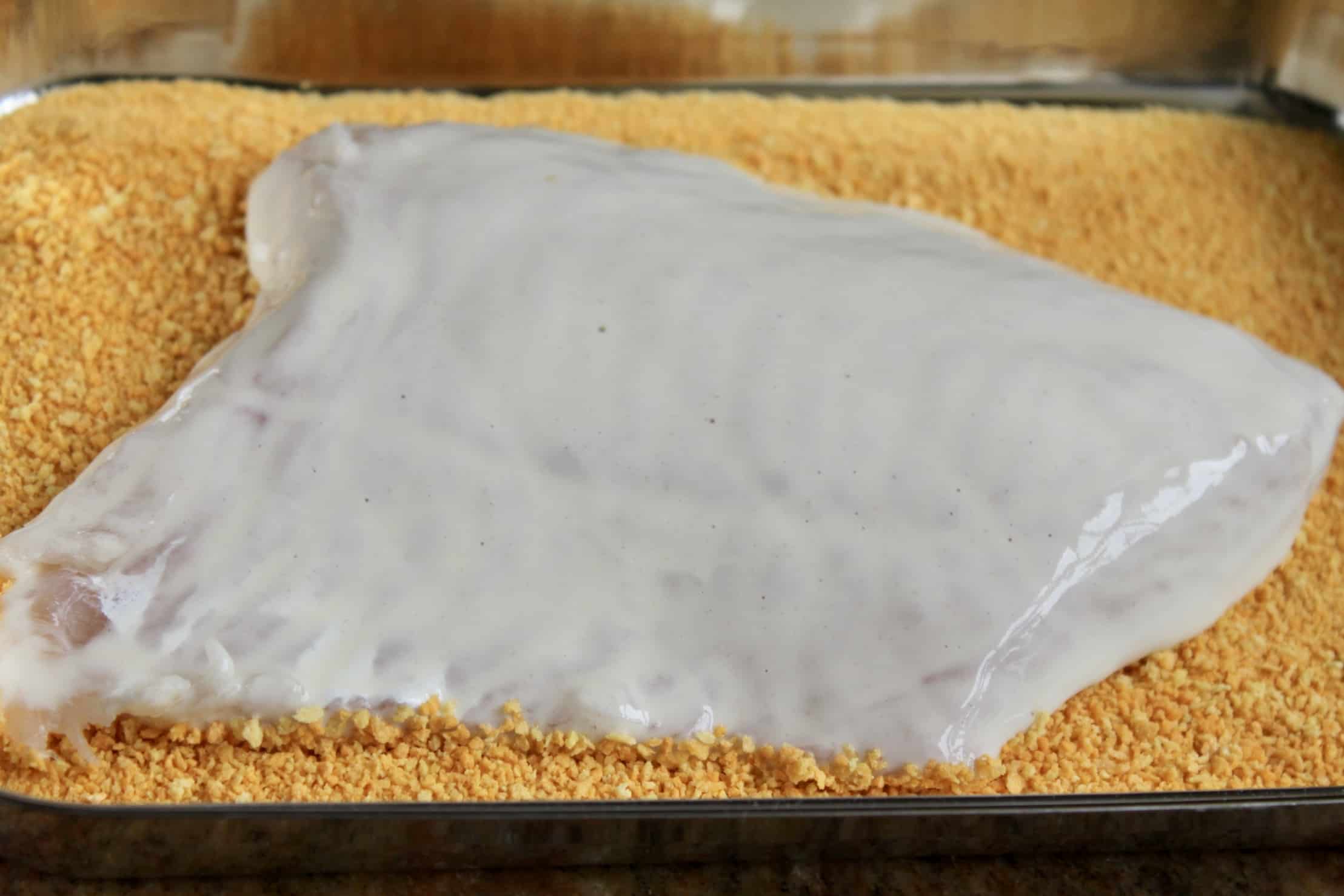
Sprinkle some fish dressing (from the canister) on top of the fish. Coat the entire filet.
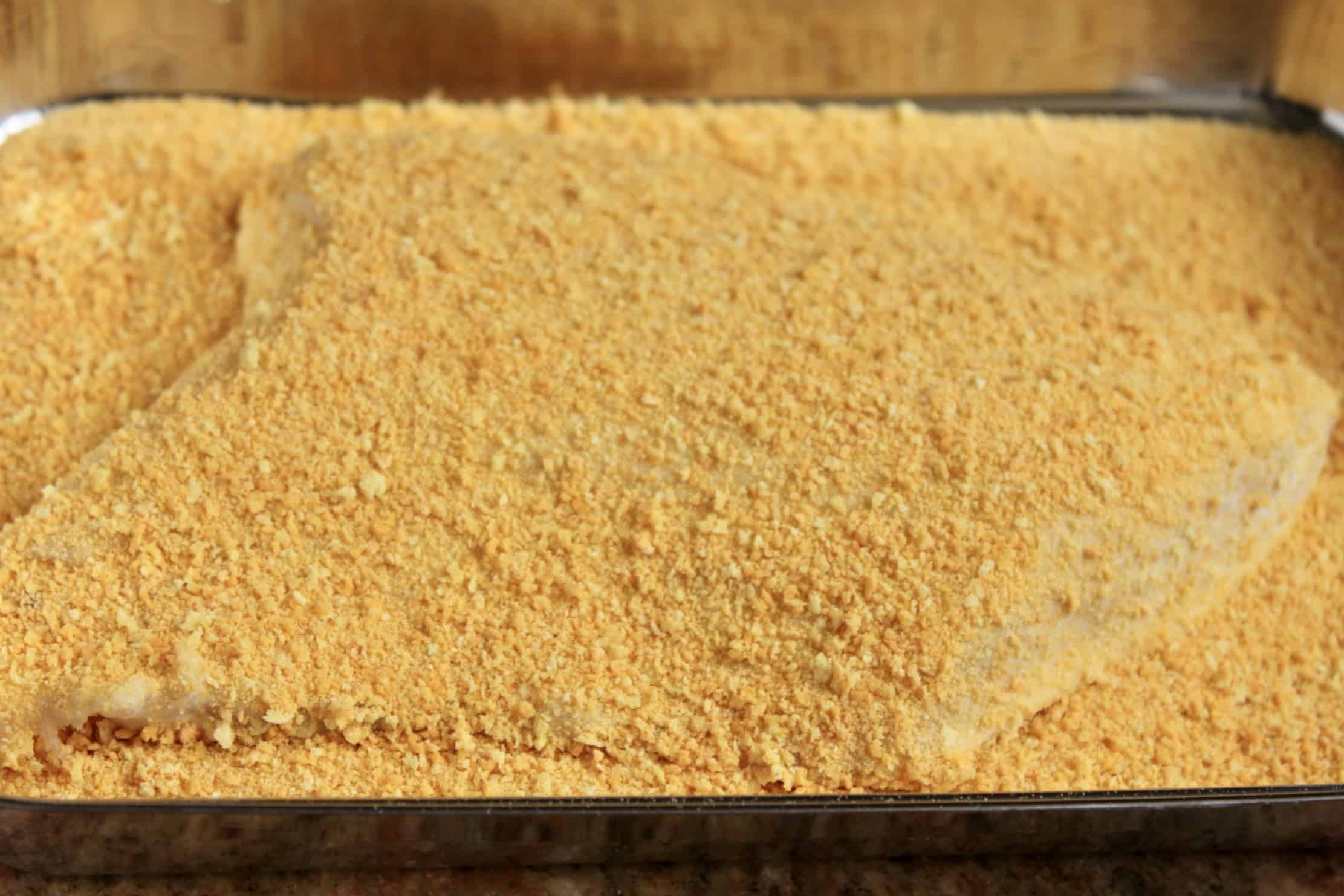
Using your fingers, lift the haddock and allow the loose crumbs to fall off and quickly, but carefully, and gently, lower the fish into the oil. If you’re not comfortable doing this, use tongs, but it will ruin your coating. Do not use a fork as the fish can split and fall into the hot oil causing it to splash on you. Please take precautions when deep frying.
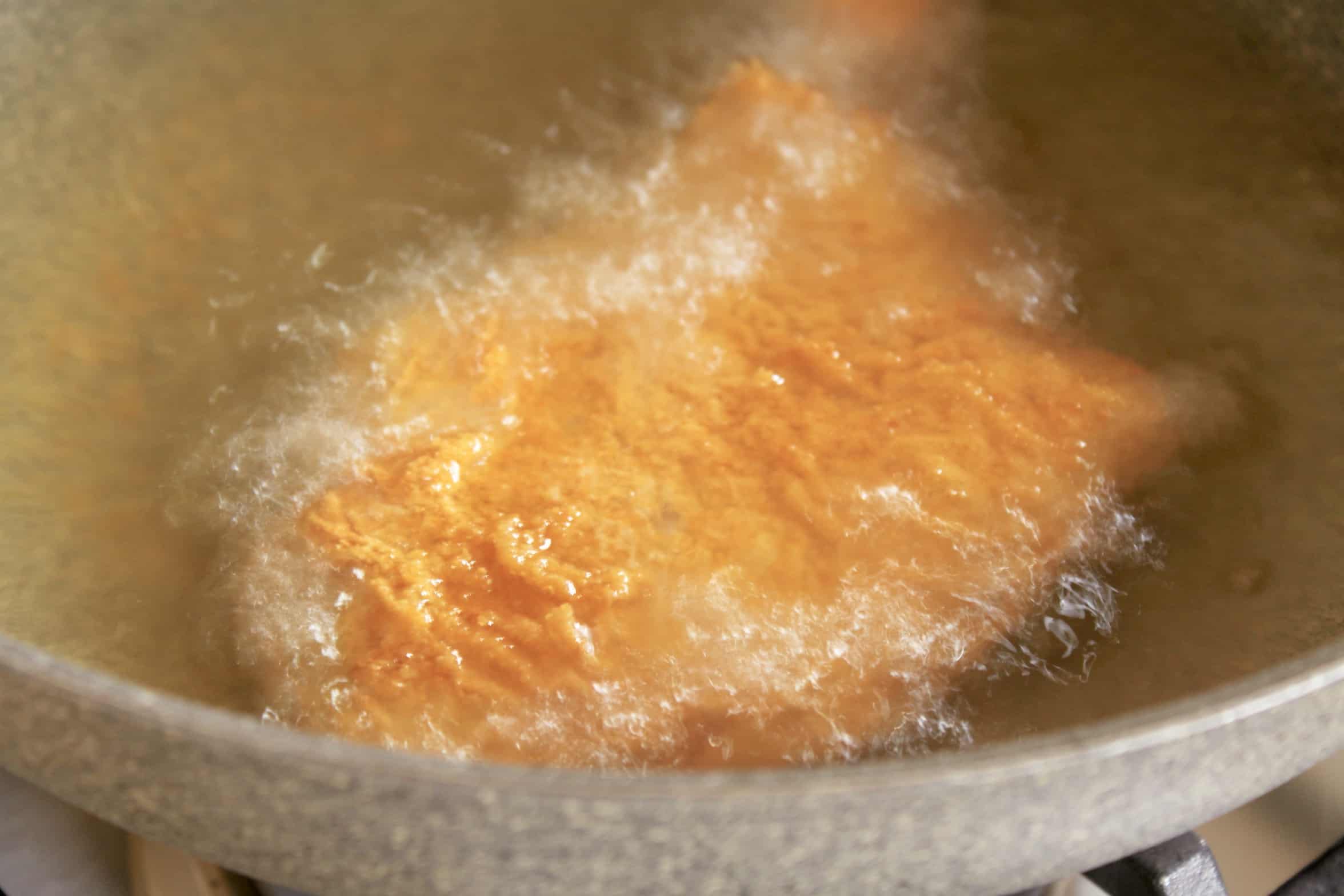
The fish should fry for about 3 minutes each side. Use a slotted skimmer and another tool (like a fork) to gently turn the fish over (don’t break the coating). If you’ve battered and breaded correctly, it will not come off the fish. Don’t overcrowd the pan, or the oil will cool too much. I’m showing one fish in the pan as I was making the fish and chips and taking photos alone, but you can fry more than one at a time.
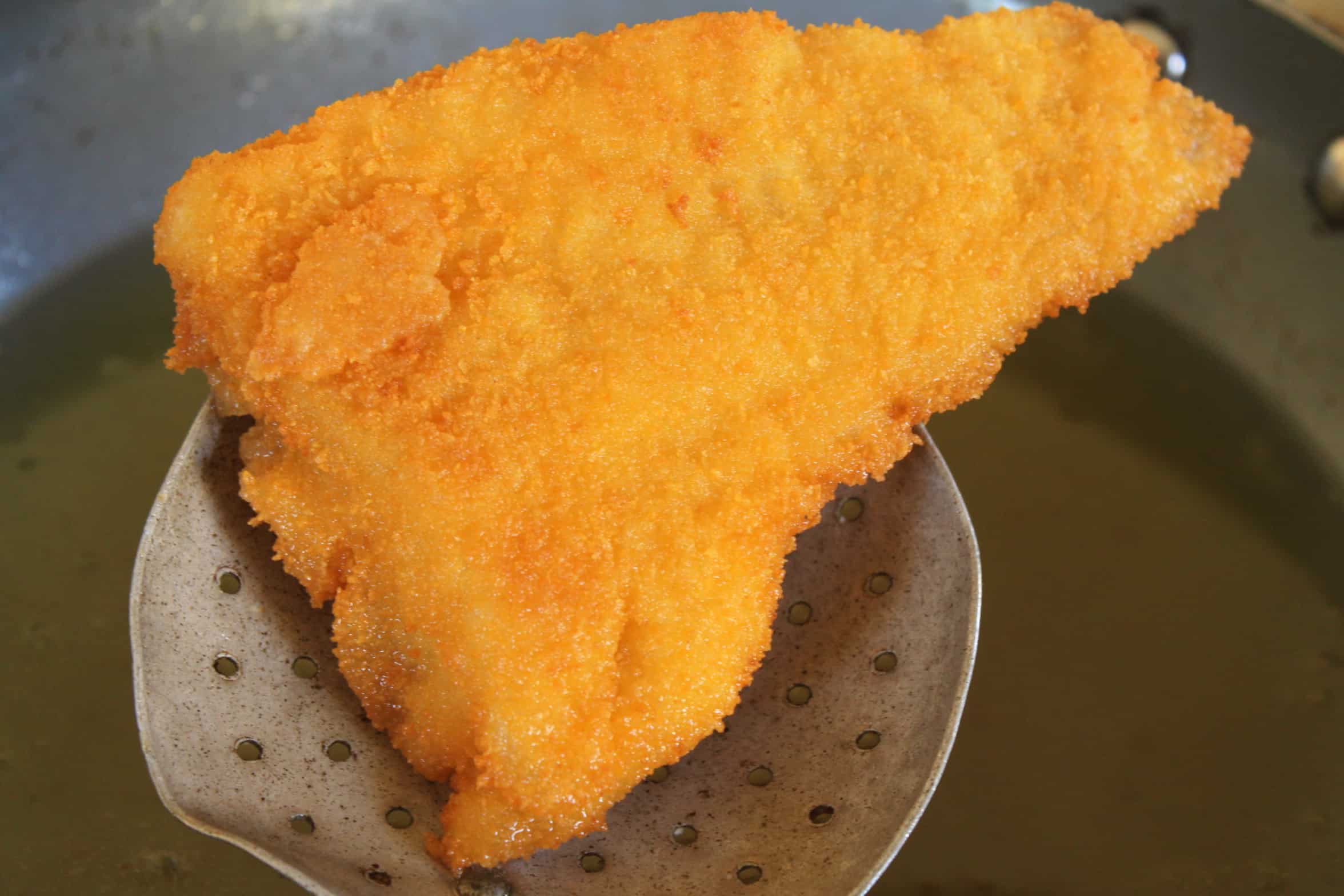
Use the slotted skimmer to take out the fish (allow the oil to drip off before placing on a paper towel lined plate or tray.
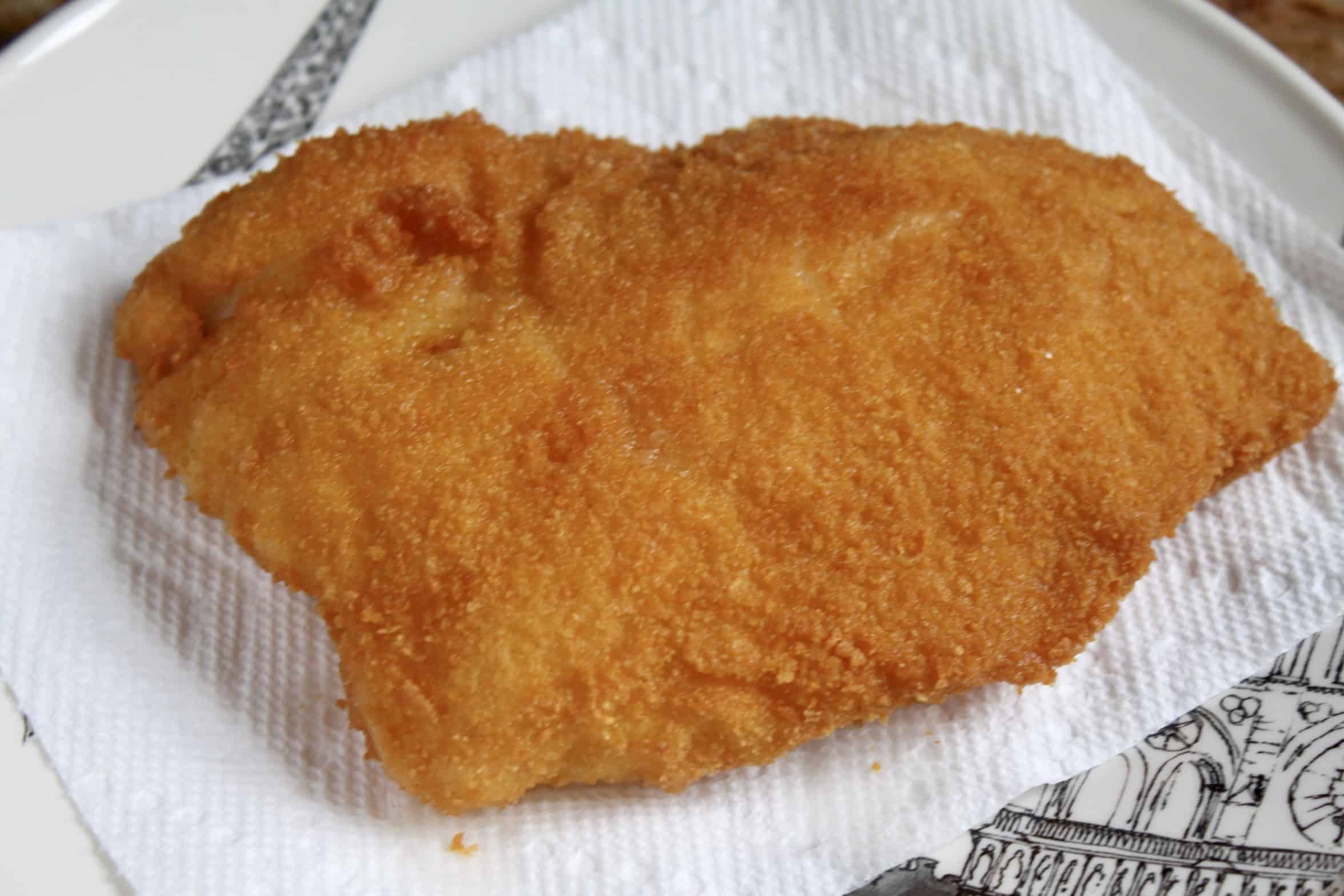
Continue with the rest of the fish. When the fish and chips are fried, it’s time to serve them, don’t wait!
Serving the Fish and Chips.
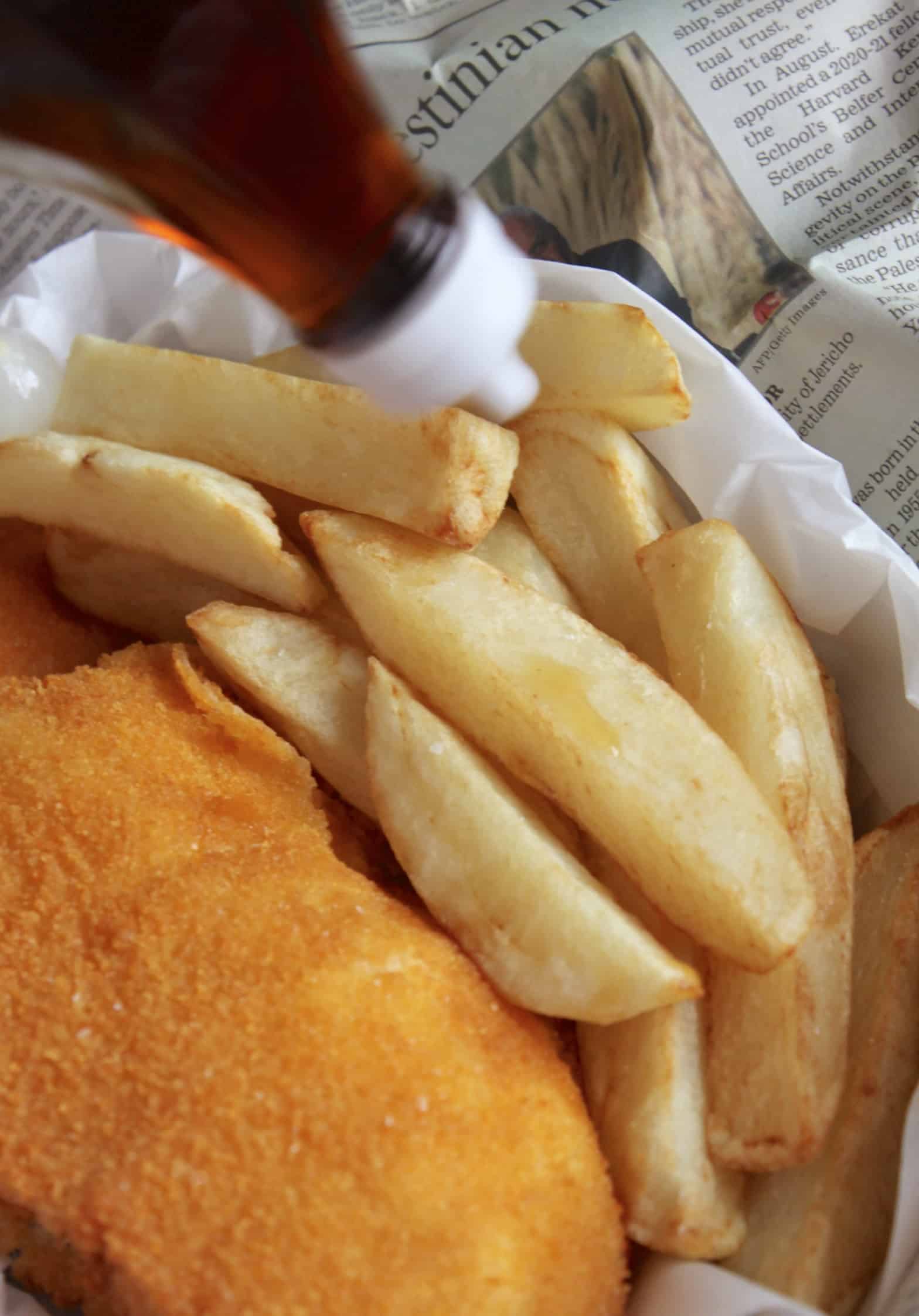
Don’t forget to salt the chips. For an authentic touch, put some parchment paper in a piece of newspaper and serve the fish, chips and onions on top of the parchment. Douse with malt vinegar!
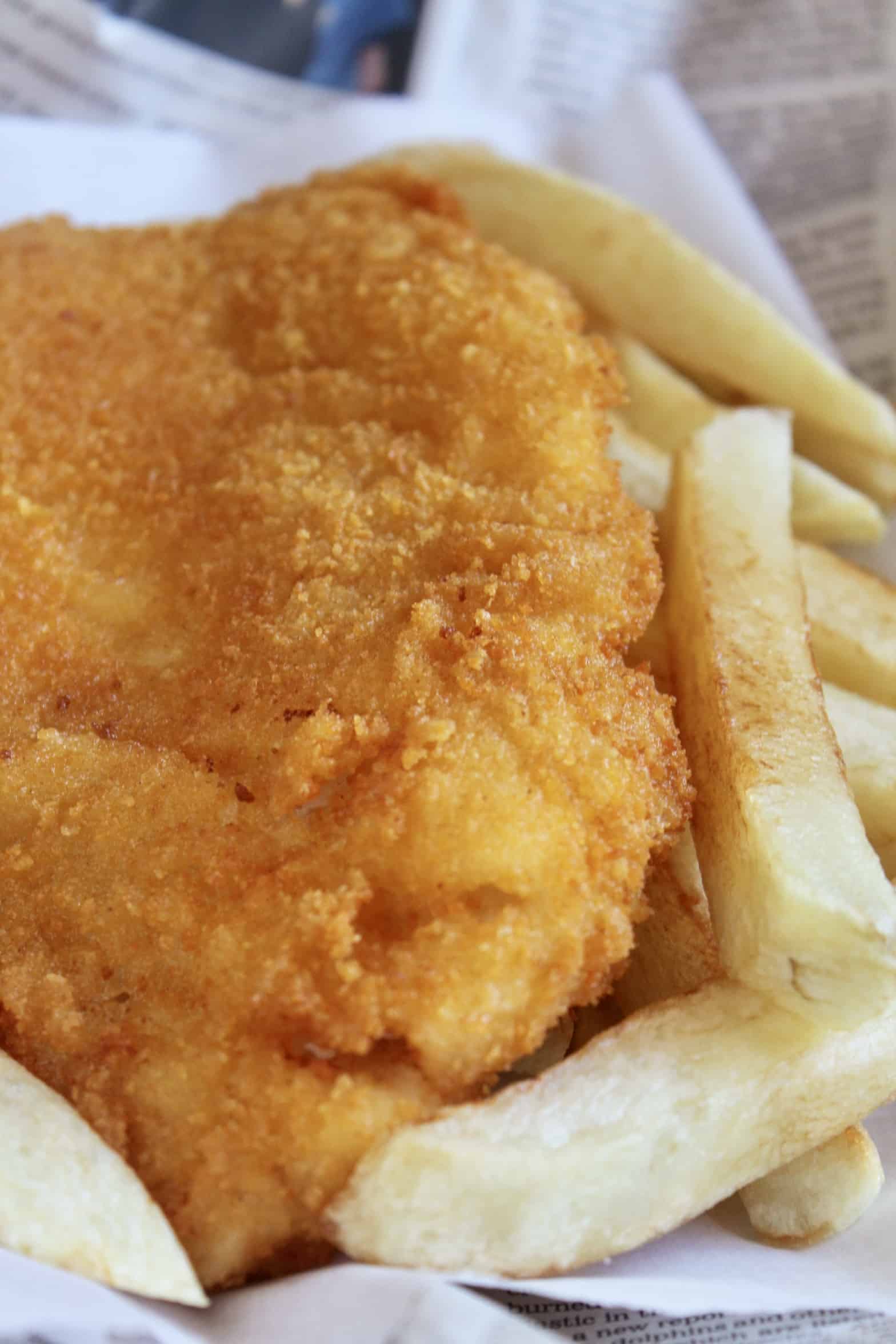
Break the fish into pieces.
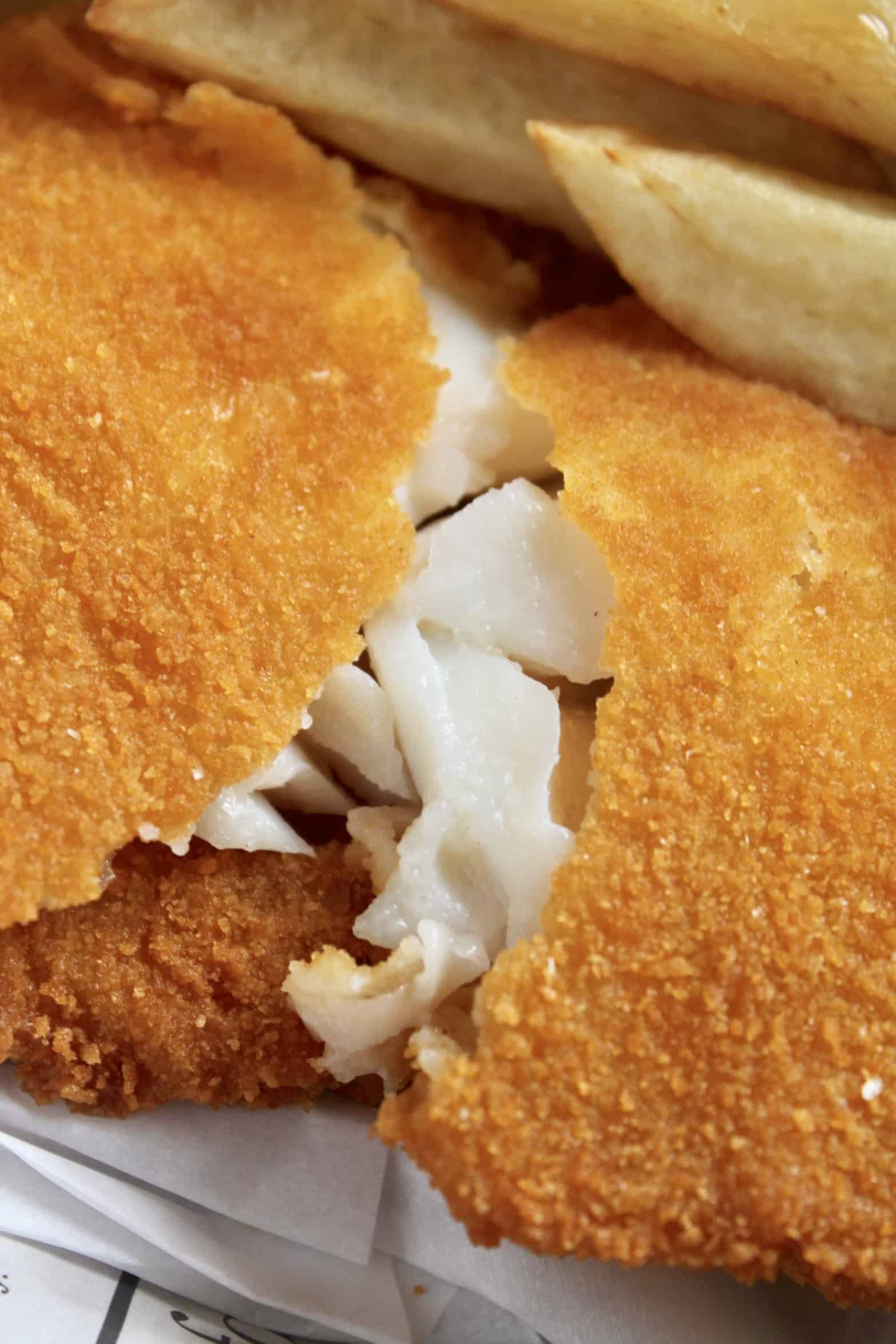
And whatever you do, don’t use a knife and fork! Fish and chips is finger food!
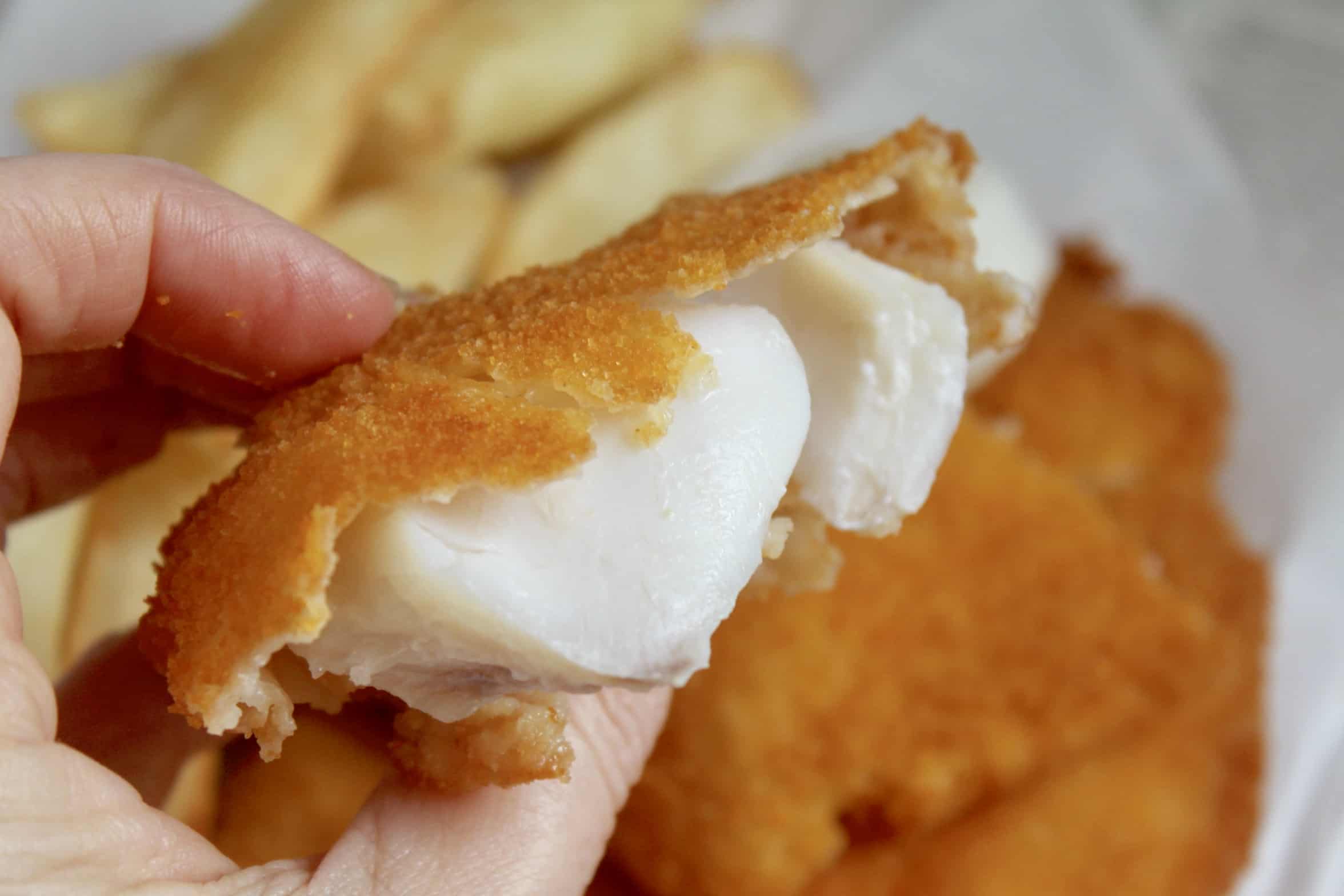
Sooo incredibly tasty!
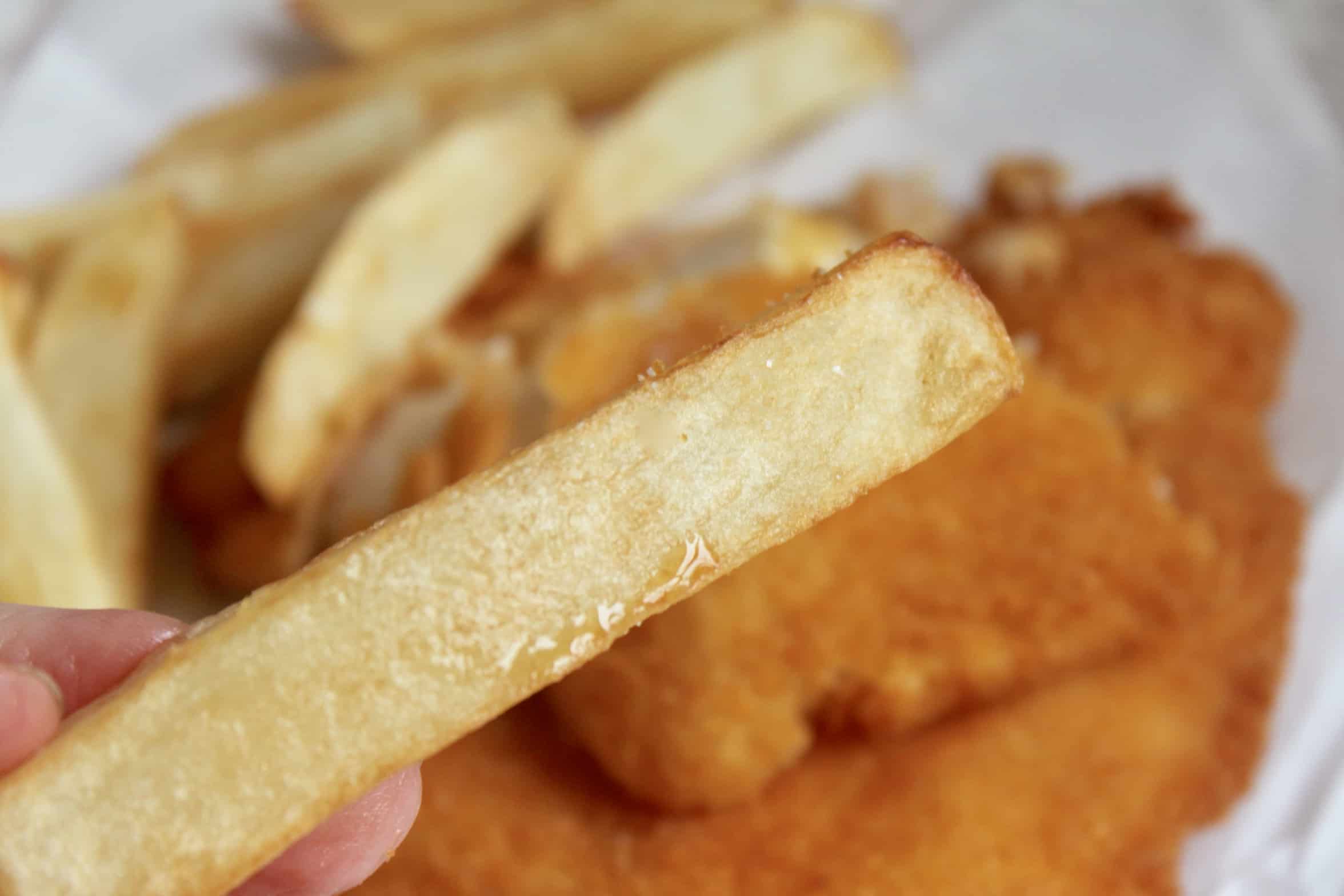
I hope you try this fish and chips recipe and please let me, and dad, know what you think of it. You can write directly to him as he will read all the comments. I’m thinking about doing an Instagram Live with him so he can talk about his experience in the fish and chip shop and you can ask him questions. Follow me on Instagram to get the details. Meanwhile, sign up for my free subcription so you never miss another recipe!

Fish and Chips (Scottish Fish and Chip Shop Recipe)
Special Equipment
- 1 set trays
Ingredients
- 3 lbs haddock or cod fillets (good quality)
- 2 tsp salt
- 1 Tbsp white vinegar
- 5 large potatoes organic russet, preferably, but Yukon Gold will work
- 1 ¼ cup flour
- 1 cup water
- 1 Tbsp milk
- ¼ tsp baking soda
- 1 cup Paxo golden breadcrumbs as needed, see NOTES
- olive oil and sunflower, or tallow to deep fry the fish and chips
Instructions
Marinate the Fish:
- Place the haddock (or cod) in a bowl and fill with water just to cover the fish (use as little water as needed). Remove the fish and add the salt and vinegar; stir to dissolve the salt.
- Put the fish back into the brine and allow to marinate for one hour at room temperature. (Minimum one hour, but if you leave it too long, it can get too salty.) Afterwards, remove the fish and put it on a rack to dry.
Cut and Soak the Chips:
- Peel and cut the potatoes into chunky, thick chips (as seen in the photo above) and put into a bowl of cold water.
- Be sure to cover all of the potatoes or they will turn black.
Prepare the Batter and Fish Dressing (Paxo Golden Breadcrumbs):
- Put the flour and baking soda into a bowl and stir with a whisk; make a well in the center.
- Mix the milk and water together in a jug and pour into the dry ingredients.
- Whisk into a batter and keep whisking until a thick consistency is formed. It shouldn't be so runny that if falls off the whisk quickly, but not so thick that it doesn't want to drip at all. The batter is a good consistency, when it flows smoothly, but slowly. Pour some into a tray, or plate, where you can batter the fish easily.
- Put some of the Paxo fish dressing in another tray or plate.
Prepare the Chips:
- No matter how you prepare the chips, dry them well after taking them out of the water.
- You have some options when it comes to preparing the chips. You can fry them in the oil where you will fry the fish, then heat them up just before you're finished frying the fish (in the oven or an air fryer). Or you can simply make the chips in the oven or air fryer, or fry them in a separate pot or deep fryer.
- If frying, I find it's worth taking the extra step to fry the chips for about 5 or 6 minutes, then remove them from the oil, let the oil heat up again, then add the chips back in to finish cooking. It makes them more crispy and delicious this way.
Prepare the Fish:
- In a large pot, or wok, heat the oil to about 360℉ (180℃).
- Pat the haddock fillets completely dry with some paper towel. If they are too large, cut them to the size you desire. Cut a little piece of fish, dip it in batter and fish dressing and fry it in the oil when it's ready. This will test the temperature of the oil and you can taste the fish to see if it needs more salt. However, Dad says it's better to undersalt than oversalt.
- Using your fingers, dip the fish into the batter and allow some to drip off before place into the Paxo golden breadcrumbs.
- Shake the tray a little to make sure the bottom is completely covered. Sprinkle some fish dressing (from the canister) on top of the fish. Coat the entire filet.
- Using your fingers, lift the haddock and allow the loose crumbs to fall off and quickly, but carefully, and gently, lower the fish into the oil. If you're not comfortable doing this, use tongs, but it will ruin your coating. Do not use a fork as the fish can split and fall into the hot oil causing it to splash on you. Please take precautions when deep frying.
- The fish should fry for about 3 minutes each side. Use a slotted skimmer and another tool to gently turn the fish over. If you've done the batter and breading correctly, it will not come off the fish.
- Use the slotted skimmer to take out the fish (allow the oil to drip off before placing on a paper towel lined plate or tray.
- Continue with the rest of the fish. When the fish and chips are fried, it's time to serve them, don't wait!
Serving the Fish and Chips:
- Don't forget to salt the chips. For an authentic touch, put some parchment paper in a piece of newspaper and serve the fish, chips, and pickled onions on top of the parchment. Douse with malt vinegar! Include HP sauce to serve.
- Break the fish into pieces, and whatever you do, don't use a knife and fork! Fish and chips is finger food!
Notes
- PAXO golden breadcrumbs (or Ruskoline in the UK)
- Serve with malt vinegar, pickled onions, and HP sauce.
- If you can, enlist some help with the frying. When frying the fish, don't overcrowd the pan, or the oil will cool too much. I'm showing one fish in the pan as I was making the fish and chips and taking photos alone, but you can fry more than one at a time.
Nutrition
Check out my cioppino recipe.
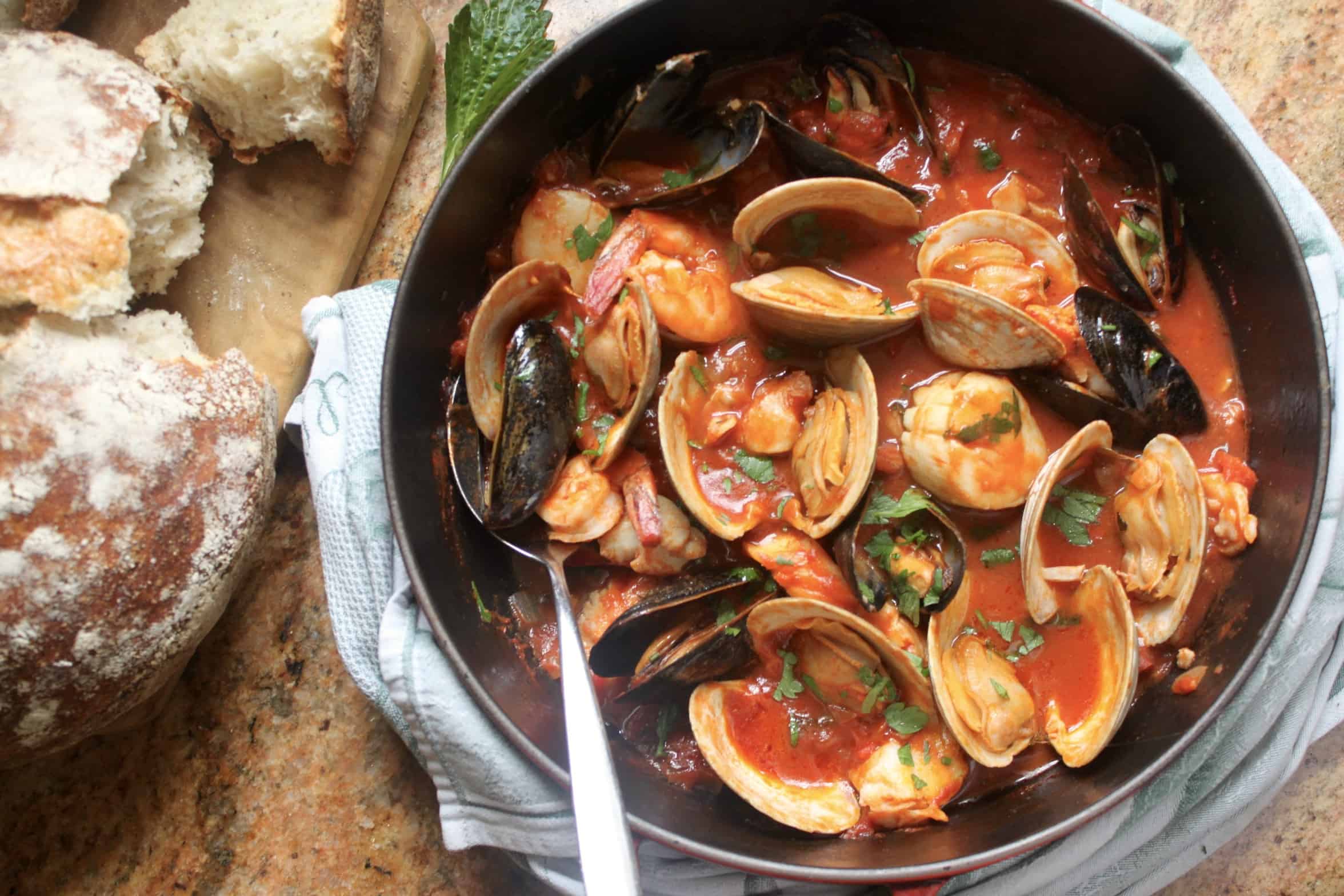
And this delicious seafood pasta with shrimp and scallops.
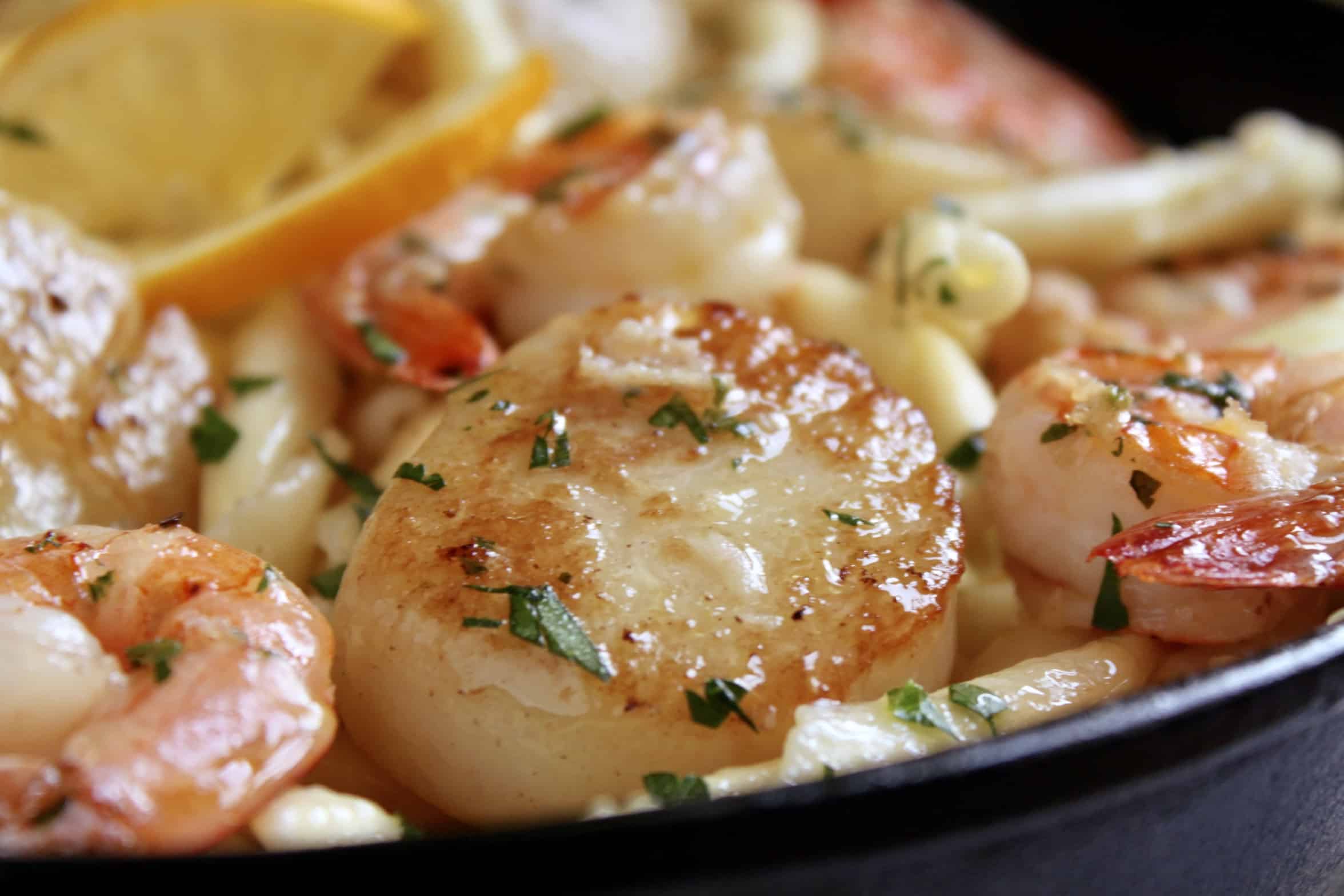
Enjoy!

Christina’s Cucina is a participant in the Amazon Services LLC Associates Program, an affiliate advertising program designed to provide a means for sites to earn advertising fees by advertising and linking to Amazon.com.


WOW AMAZING ..I WISH TO DOWNLOAD IT
HP Sauce
I use haddock also for my fish and I have finally found Ruskoline in Canada! I live in the States but take a trip over the border a few times a year. Pago is fine. But I still love my Ruskoline!
Oh yes, I do agree, but happy to have found Paxo in the US!
Ah, I’ve lived in England for nearly 40 years and I STILL miss the Italian chip shops in the west of Scotland where I grew up. Fish and Chips in England aren’t nearly so good!
I have to agree with you, Flora!
my mum lived round the corner from your dad’s shop and ate from there often.
Wow, that’s amazing Elaine! Thanks for the note, I will tell my dad!